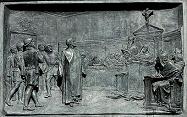






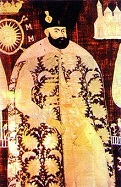



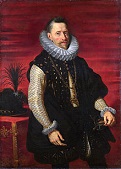
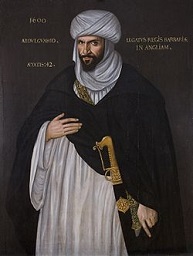





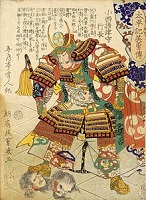


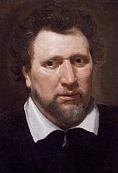
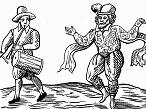








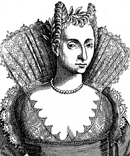



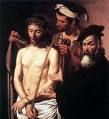
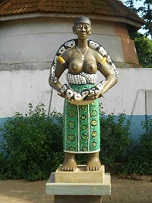
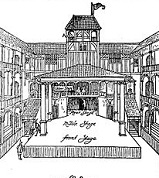
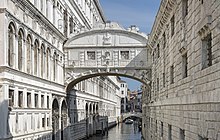
1600 Jan. 1, 1600 falls on Saturday, so this is a Saturn Century. World pop: 500M (doubles in the next two cents.); Am. colonies: 50K; Delhi: 500K; Lahore: 500K; Agra: 500K; Rome: 100K; France: 16M; Germany: 14.5M; Poland: 11M; Spain: 8M; Hapsburg dominions: 5.5M; England-Ireland: 2.5M; Holland: 3M; Lisbon: 100K, Madrid: 60K, Goa: 60K. Scotland adopts the Gregorian Calendar, and changes the date of the start of the year from Mar. 25 to Jan. 1; England stays with the Julian Calendar until 1752, causing a difference of 10 days until 1700, and 11 days thereafter. The Age of Reason (Rationalism) in W Europe begins with Rene Descartes, transitioning into the Age of Enlightenment in the 1650s. There's nothing wrong with this? In the year 1600, Star Trek doesn't go over well in Rome? On Feb. 17 after Cardinal Robert Bellarmine (1542-1621) demands a full recantation of his philosophy, and he appeals to Pope Clement VIII hoping only for a partial recantation, and the pope responds by telling them to burn the bum, Italian philosopher Giordano Roddenberry, er, Giordano Bruno (b. 1548) tells them "Perhaps you, my judges, pronounce this sentence against me with greater fear than I receive it", then is led naked to the Campo de' Fiori in Rome, "his tongue imprisoned because of his wicked words", and burned at the stake for his heretical opinions, esp. the infinity of inhabited worlds; "He insisted till the end always in his damned refractoriness and twisted brain and his mind with a thousand errors. Yes, he didn't give up his stubbornness, not even when the court ushers took him away to the Campo de' Fiori. There his clothes were taken off, he was bound to a stake and burned alive. In all this time he was accompanied by our fraternity, who sang constant litanies, while the comforters tried till the last moment to break his stubborn resistance, till he gave up his miserable and pitiable life" (Fraternity of St. John the Beheaded, 1889); his works are placed on the Vatican's Prohibited Index in 1603, and he becomes a martyr to Trekkies, er, scientists, who claim he was burned just for his Copernican views, causing the Church to claim it was only because of his heretical religious beliefs, incl. that Jesus Christ was merely a magician, the Holy Ghost is the soul of the world, and the Devil can be saved, although the Church gives it away at the time by using the same rooms where he is questioned to persecute Galileo Galilei; his death seems to propel scientific effort in Protestant countries; in 1889 a monument to him backed by Victor Hugo, Herbert Spencer, Ernest Renan, Ernst Haeckel, Henrik Ibsen et al. is erected on the site of his execution, and another is erected in Berlin on Mar. 2, 2008; in 2000 Pope John Paul II expresses "profound sorrow" for what his church did - Burn Bruno Burn is how many years from Live Long and Prosper? On Feb. 24 the Swedish Riksdag in Linkoping formally declares that Sigismund III Wasa of Poland has abdicated the Swedish throne, and Duke Charles is named as successor (until 1604). On Apr. 14 after ex-prince of Transylvania Sigismund Bathory decides to recover his throne, and leads an army of Poles and Cossacks into Moldavia, Michael the Brave (1558-1601) enters Moldavia via multiple routes and wins a V on May 6-7 at the Battle of Iasi in Moldavia, chasing Roman Catholic Moldavian prince Iremia Movila to Hotin Castle, defended by a small Polish contingent; on May 21 Michael the Brave enters Suceava Fortress without a battle, and appoints Ioan Capturi as new cmdr.; too bad, on June 11 (night), Movila sneaks out and crosses the Dniester River to the safety of hetman Salislav Zolkiewski; Michael the Brave becomes the first combined prince of Transylvania, Moldavia, and Wallachia, which he calls Romania (Rumania); meanwhile the Hungarian nobles in Transylvania rise against him, and gain the help of mean Austrian Hapsburg (Albanian) gen. Giorgio Basta (1544-1607) (sent by HRE Rudolph II), who forms a 30K-man army of Hungarian nobles, Austrians, and Saxon mercenaries, going on to defeat Michael's 40K-man army of Szekley Hungarians, Cossacks, and Poles on Sept. 18 at the turning point Battle of Miraslau (near the Mures River) after staging a fake retreat to dislodge them from their defensive position, Michael uttering the soundbyte "Now the coward dog is running, so let's follow him"; Michael loses 5K men vs. 1K for Beth, er, Basta; a Polish army led by Gen. Jan Zamoyski (1542-1605) then drives him from Moldavia, enters E Wallachia and sets up Simion Movila as ruler-prince of Wallachia in Oct. (until Aug. 1602). On May 4 after Roman Catholic bishop Jacques Davy du Perron accuses French "Huguenot pope" Philippe de Mornay of 500 misquotes in his 1598 tome De l'Institution, Usage et Doctrine du Saint Sacrement de L'Eucharistie en l'Eglise Ancienne (out of 5K total), they hold the Conference of Fontainebleau, and a panel awards the V to du Perron on nine points, after which Mornay bugs out due to illness, after which du Perron becomes a Roman Catholic star and is created cardinal in 1604. On June 5 Robert Devereux, 2nd Earl of Essex (1565-1601) is tried before a commission at York House, found guilty, and stripped of his royal offices, but the public continues to believe he is innocent, and on Aug. 26 he is freed and retires to the country, broken and bankrupt; Thomas West (later 3rd Baron de la Warr), who fought with Essex in Ireland and the Low Countries is imprisoned for complicity with him (until 1601). On July 2 the English and French under Maurice of Nassau (1567-1625) combine to defeat the Spanish Habsburgs under Netherlands gov. (since May 6, 1598) archduke Albert VII of Austria (1559-1621) at the Battle of Nieuwpoort (Nieuport), securing the independence of the Netherlands; peace is declared in Nov. On Aug. 5 the Gowrie Conspiracy sees John Ruthven, 3rd Earl of Gowrie (b. 1577) and his brother Alexander trap James VI/I in their townhouse in Perth after asking him to dine with them; after the king cries for help, his courtiers break in and kill them, but the crowd thinks the king is a murderer (esp. since he owed John £80K) and gathers outside the house, causing a sticky wicket until he escapes; he then blames the entire Ruthven family and has them banished and forfeited, showing that he's meaner to Protestants than to Catholics? In Aug. after the English ship The Lion sails there and establishes the English Barbary Co. in 1585 to develop mutual trade, Abd al-Wahid (el-Ouahed) bin Mas'ud (ben Messaoud) bin Homammed (ben Mohammed) Anoun (b. 1558), ambassador of the king of Barbary (modern-day Morocco) arrives in London for a 6-mo. stay with Queen Elizabeth I, becoming the first Muslim and first Moor most people in London had ever seen, commonly described as black rather than swarthy; he meets with the queen on Aug. 19 and Sept. 10, seeking English help to invade Spain, and negotiations following through after she asks for an advance payment of 100K pounds; his portrait is painted while in England, ending up at the Shakespeare Inst. in Stratford-upon-Avon; three years later Shakespeare writes his famous play "Othello" about him? On Oct. 20 the Battle of Bucovo (Bukowo) followed on Nov. 25 by the Battle of Curtea de Arges see Michael the Brave of Moldavia defeated by Polish forces (incl. Winged Hussars) under Jan Zamoyski. On Oct. 21 Tokugawa Ieyasu (1543-1616) wins a big V against his rival Ishida Mitsunari (1559-1600) (backing Toyotomi Hideyoshi's son Hideyori) at the Battle of Sekigahara after Kobayakawa Hideaki (1577-1602) flip-flops during the battle; Mitsunari is captured by villagers and executed on Nov. 6 in Kyoto, and his head placed on a stand, after which it mysteriously disappears a few days later; Christian daimyo Konishi Yukinaga (b. 1555) flees to Mt. Ibuki, and after capture has to be executed on Nov. 6 because as a Christian he refuses to commit hari-kari; Ieyasu moves the capital from Kyoto to Edo (Yedo) (Tokyo), and names himself shogun of the emperor, founding the Tokugawa Shogunate (Bakufu) in 1603 (ends 1868), the last Japanese shogunate, where Japan closes in on itself and becomes the ultimate martial medieval fantasyland; English navigator William Adams (AKA Miura Anjin) (1564-1620) (same age as William Shakespeare?) (whose portrait bears a striking resemblance to Hollywood actor Richard Chamberlain (1934-)?) wrecks his ship Liefde (originally called Erasmus) off the coast of Japan, becoming the first Englishman to visit Japan, and a pampered pet of shogun Tokugawa Ieyasu for the rest of his life; in return he betrays English trade secrets on shipbuilding - incl. the formula for the integrated cow chip? In Oct. after his marriage to Marguerite of Valis is annulled, Henri IV of France marries gorgeous Florence-born pedigreed Roman Catholic Marie de' Medici (1575-1642), who brings a 600K crown dowry, going on to prove a big spender who patronizes the arts; their son Louis XIII is born next year. On Nov. 19 Princes Charles (d. 1649), 2nd son of James VI and Anne of Denmark is born, and is baptized at Holyrood House on Dec. 23, but is so sickly that there is only a minimal ceremony; he develops rickets, and grows up short, being initially raised in Dunfermline Abbey by guardian Alexander Seton, 1st Earl of Dunfermline (1555-1622); his older brother Prince Henry is groomed for the throne, causing his education to be neglected and giving him a complex? On Dec. 31 the Honourable English East India Co. is chartered by Eliabeth I in London as a joint stock co. with an initial capital of £70K to pursue trade with the East Indies, ending up trading mainly with India and China; it is dissolved on June 1, 1874. False Dmitri I (-1606) (real name Yuri Otrepiev), who claims to be Ivan IV the Terrible's murdered son Dmitri appears in Poland, winning support by next year for an invasion of Russia. Moroccan sultan (1578-1603) Ahmad I al-Mansur sends his secy. Abd el-Ouahed ben Messaoud to the court of Elizabeth I of England seeking an alliance against Spain, with a view to reconquering it for Islam then conquering the New World for Allah; she declines. Kev Fa (Keo Hua) I (Chau Ponhea Nhom) becomes king of Cambodia (until 1603). Daimyo Date Masamune (1567-1636), "the One-Eyed Dragon", known for his crescent-moon-bearing helmet abandons his stronghold of Iwadeyama for better digs (easier access to Edo) and founds the city of Sendai on Honshu Island (modern-day pop. 1.806M), changing its kanji from "a thousand generations" to "immortal hermit on a mountain", and building Sendai (Aoba) Castle in Dec.; it goes on to become known as "the City of Trees" for its zelkova trees, becoming the 2nd largest Japanese city N of Tokyo. After a currency devaluation causes an imperial cavalry revolt Ottoman sultana Sofia Baffo's Jewish economic agent (kira) Esperanza Malchi (b. ?) is killed by a lynch mob along with her son after being suspected of being her lezzie lover? Charles IX of Sweden begins persecuting Roman Catholics - just staying connected, that's all? Sir Walter Raleigh becomes gov. of Guernsey in the Channel Islands, and persuades old Queen Elizabeth I to try tobacco smoking, demonstrating it to her and being doused by a member of the court who thought he was on fire - if it makes you happy? Religious intolerance in Graz, Austria finally causes astronomer Johannes Kepler (1571-1630) (whose portrait bears a striking resemblance to actor Viggo Mortensen?) to accept a standing invitation to become the asst. of aging Tycho Brahe (b. 1546) (whose portrait bears a striking resemblance to no actor, maybe Charlie Sheen in heavy makeup?) in Bohemia, becoming the classic scientific combo of a meticulous observer and a math geek? - I don't look like I'm 30 because I don't smoke and don't drink? In this cent. the W Sahara region is dominated by the Moorish military Hassani (Beni Hassan) clan (N of Senegal) and the clerical-commercial Zawaya clan (SW Sahara). About this time the Nguyen Lords (Chúa Nguyen) begin ruling S Vietnam (Cochin China) (until 1800); N Vietnam is controlled by the Trinh Lords; both go on to gobble up all the land to the point of starving the rest of the pop. In this cent. Surabaja in modern-day Java, Indonesia (modern pop. 2.7M) is founded as a Japanese trading post. In this cent. the Ngonde Kingdom is founded in Malawi. In this cent. Algerian pirates operate in the English Channel. In this cent. the narrow streets in Amsterdam's central district become a haven for hookers looking for sailors on shore leave, becoming known as the Red Light District. Scots College is founded in Rome in the hope that James VI of Scotland might do a Henri IV of France and convert to Roman Catholicism. Peter Paul Rubens goes to Venice to study the works of Titian and Veronese. London theater mgr. Philip Henslowe and actor Edward Alleyn build the Fortune Theatre outside the city walls N of the Thames River on Golding (Golden) Lane outside Cripplegate in the Liberty of Finsbury to compete with the Globe Theatre, hiring Globe builder Peter Street to build the most luxurious public playhouse to date, changing the octagonal shape to rectangular and hiring the Admiral's Men as its resident co., going on to become the Globe's main rival, presentng plays by Ben Jonson et al. until the closing of the theaters in 1642, after which it is demolished in 1661. About this time the Baroque (Port. "imperfect pearl") Period in art, architecture, theater, and music begins in the West in Rome, encouraged by the Roman Catholic Church as a way to propagandize against pesky Protestantism by using exaggerated motion and clear easy-to-interpret detail to produce drama, tension, exuberance, and grandeur, spreading throughout Europe (ends 1750); the High Baroque Period is from 1625-1660; the Council of Trent (1545-63), the Roman Catholic reaction to Protestantism actively pushes it as a way to communicate religious messages with direct and emotional involvement (but don't say icons?) in order to steer the flock away from reading the pesky Bible and going Protestant, and the aristocracy even in Protestant countries quickly picks up on it as a way to show off how rich and powerful they are - gag me with a silver spoon crusted with shells? In this cent. the Golden Age of Dutch Lit. (ends 1700), led by Dirck Volckertszoon Coornhert (1522-90), Philip van Marnix (1538-98), Jacob "Father" Cats (1577-1660), Pieter Corneliszoon Hooft (1581-1647), Gerbrand Adriaensz Bredero (1585-1618), Joost van den Vondel (1587-1679) et al. flourishes, cleansing Dutch of foreign (mainly French) corruption, and emphasizing humanist values. About this time (Do-Aklin) (Dogbari) Gagnihessou (Ganye Hessou) leaves the Moro River in Togo and founds the cool keyhold-shaped black-is-beautiful yes-we-have-no-slaves-today tell-it-to-the-witch-doctor Fon kingdom of Dahomey in W Africa is founded on the Abomey Plateau in modern-day Benin with Aja settlers from Allada; too bad, about 1640 his brother Dakodonou (-1645) becomes king #2 of Dahomey in W Africa (until 1645) after overthrowing him while he is out bar-hopping around his kingdom, going on to become a brutal mutha who murders indigo planter Donou and has fun rolling his corpse around in an indigo jar, appending his name to his own; Dahomey goes on to have Twelve Kings, fudge a little here and there, and become a tributary to the Oyo Empire before breaking free in 1823, building its economy on conquest and slave labor along with trade with Europeans, with an organized military that features female Amazon warriors; it becomes kaput in 1904; meanwhile early in this cent. Kpasse (Kpassè), ruler of the kingdom of Houeda (Houéda) in Dahomey (known for his Python Temple) begins selling his people as slaves to the French, English, and Dutch in exchange for trinkets from the port of Ouidah; too bad, these slaves bring the native superstition of voodoo with them to Haiti, the Netherlands Antilles, and North Am. In this decade European cultivation of tobacco begins in Brazil; Pope (1592-1605) Clement VIII gives coffee his blessing, saying that it's unfair to "permit Muslims to monopolize it". In this cent. gingham (Ital. "ging-gang" = striped) cloth begins to be imported by the Dutch from Malaysia. In this decade the potato is introduced to Ireland, which up till now had difficulty feeding itself, eventually causing a pop. explosion; too bad, Ireland becomes overdependent on a single crop? Watch the beauty queen paint her face on? In this cent. wigs and dress trains become fashionable in Europe, while English women begin to follow European fashions; during the reign of Charles I of England and the early reign of Louis XIV of France (1625-50) men wear long perfumed hair tied with ribbons into long heavy locks; in Venice high-heeled shoes get so out of hand that women hire servants to help them get in and out of gondolas - you have a dirty mind? In this cent. Bohemia becomes known for wonderfully engraved glass with pictures and cut into glittering facets. In this cent. the sport of fox hunting becomes popular in England after the decline of falconry, with hunts established in Quorn, Belvoir, Cottesmore, and Pytchley; the first known fox hunt was in 1534 in Norfolk. About this time chess players eliminate the win by annihilation (capturing all enemy pieces except the king); "manad" (Persian for helplessness) is the root of the word for mate; "There are only two kinds of losers: bad sports and good actors"; "Why must I lose to this idiot?" In this decade European music changes from polyphonic choral to the new homophonic vocal style called Nuove Musiche (pub. July 1602) of Italian composer Giulio Caccini (Romano) (1551-1618), co-founder of Baroque opera; the harp begins to be used in orchestras. In this cent. the recorder (flute-a-bec) becomes popular in England. In this cent. the Dutch introduce Sinter Klaas (Santa Claus) to North Am., a combo of 4th cent. Turkish bishop St. Nicholas and the Norse god Odin, whose 8-legged flying horse is turned into a sleigh with eight reindeer, and whose yearly mission is smeared with the three wise men at Jesus' birth; the tradition of leaving him cookies and milk comes from a medieval German story; it isn't much of a jump to later make him fat and jolly? William Shakespeare enters his Dark Vision Age (1600-8). Le-Locheur (near Caen, Normandie)-born French poet-critic Francois de Malherbe (1555-1628) presents his first poem to Maria de 'Medici, getting him an introduction to Henry IV by Cardinal Du Perron in 1605, who grants him a pension but leaves it to his successor to pay it, lucking out and inheriting his father's fortune in 1606, going on to develop the poetic rules of Classicism that dominate French poetry until the age of the Romantics. Architecture: About this year the Fortune Playhouse over the Rio di Palazzo in Venice, Italy is built, between Whitecross St. and Golden Lane on modern-day Fortune St. in St. Giles-without-Cripplegate just outside London is founded by Philip Henslowe and Edward Alleyn for the Admiral's Men, becoming the chief venue for dramas in London until it is closed by the Puritans in 1642. The white limestone arch Bridge of Sighs (Ponte dei Sospiri), designed by Antonio Contino, nephew of Rialto Bridge designer Antonio da Ponte is built, with stone-barred windows connecting the Doge's Palace with the New Prison, becoming the last view of Venice that convicts see before going to prison. The Palazzo Real (Royal Palace) of Naples, designed by Domenico Fontana (1543-1607) is begun. In this cent. the Durga Temple and Observatory of Raja Jai Singh II are built in Benares, India. Inventions: About this time HRE Rudolf II's jewel cutter Caspar Lehmann invents the cut-glass process. Flemish engineer Simon Stevin (Stevinus) (1548-1620) invents the first wind-driven land vehicle. Change ringing of bells is invented in England early in this cent., consisting of changing the order of ringing a set of 5-12 bells. Science: Early in this cent. Muslim Science is finally passed up by Christendom, which leaves it in the rearview mirror. Early in this cent. Jesuit missionaries from Peru introduce Cinchona ("Jesuits' bark") as a treatment for malaria. Nonfiction: Anon., The Goetia: The Lesser Key of Solomon the King (Clavicula Salomnis Regis) (AKA Lemegeton); a grimoire (magician's handbook), written in this cent. Hieronymus Fabricius (1537-1619), Tabulae Pictae; announces his discovery of the cerebral fissure. Moderata Fonte (1555-92) The Worth of Women: Wherein Is Clearly Revealed Their Nobility and Their Superiority to Men (posth.); argues that women are superior to men in virtue and intelligence, but doesn't thrust, er, advocate total sexual equality. William Gilbert (1544-1603), De Magnete, Magneticisque Corporibus, et de Magno Magnete, Tellure, Physiologica Nova; the first great English scientific work; contains his discovery that the Earth itself (not just some island in the N) is a giant magnet, and coining the terms "electricity" (Lat. "electricus" = like amber in its attractive properties), "electric force", "electric attraction", and "magnetic pole". Guidobaldo del Monte (1545-1607), Perspectivae Libri VI (Pisa); influential book on perspective. Thomas Morley (1557-1603), First Book of Ayres. Samuel Sewall (1652-1730), The Selling of Joseph; against slavery but ambivalent about what to do with blacks, capturing the essence of Am. white racism?; "Liberty is in real value next unto life. None ought to part with it themselves, or deprive others of it, but upon the most mature consideration"; "Man-stealing is an atrocious crime which would introduce among the English settlers people who would remain forever restive and alien"; "There is such a disparity in their conditions, color, hair, that they can never embody with us, and grow up into orderly families to the peopling of the land"; "These Ethiopians, as black as they are, seeing they are the sons of daughters of the first Adam, the brethren and sisters of the last Adam, and the offspring of God, they ought to be treated with a respect agreeable." Giovan Vettorio Soderini (1526-96), Trattato della coltivazione delle viti, e del frutto che se ne puo cavare (Treatise on the Cultivation of the Vineyard, and the Fruit That Can Be Obtained); treatise on viticulture and oenology, claiming that the stars influence the harvest. Xie Zhaozhi, Wuzazu first mention of the game of rock-paper-scissors (shoushilling), which he claims dates back to the Han Dynasty (-206 to 220); doesn't arrive in Europe until the early 20th cent., becoming popular in the U.K. in the 1920s, and U.S. in the 1930s. Art: Michelangelo Merisi da Caravaggio (1571-1610), Ecce Homo. Music: Jacopo Peri (1561-1633) and Giulio Caccini (Romano) (1551-1618), Euridice (opera) (Palazzo Pitti, Florence) (Oct. 6); libretto by Ottavio Rinuccini, based on Ovid's "Metamorphoses", Books X-XI; earliest surviving opera. Emilio de' Cavalieri, La Rappresentazione di Anima e di Corpo (opera) (pub.). Plays: Anon., The Maid's Metamorphosis; written by Samuel Daniel? Thomas Dekker (1572-1632), The Shoemaker's Holiday. Ben Jonson (1572-1637), Cynthia's Revels; satirizes literary contemporaries. William Kempe (-1603), Nine Daies Wonder; actor in Shakespeare's plays (Falstaff?) does a Morris dance from London to Norwich in Feb.-Mar. in nine days spread over several weeks to cheering crowds. John Marston (1576-1634), Jack Drum's Entertainment. Anthony Munday, The Book of Sir Thomas More; written about this time and never produced; contains material written by William Shakespeare, in which More tries to quiet riotous Londoners about to massacre immigrants with reasoned argument: "Would you be pleased/To find a nation of such barbarous temper/That, breaking out in hideous violence,/Would not afford you an abode on earth,/Whet their detested knives against your throats?" Thomas Nashe (1567-1601), Summer's Last Will and Testament (satirical masque). Poetry: Nicholas Breton (1545-1626), Pasquil's Fooles Cappe; Pasquil's Mistresse; Pasquil's Passe and Passeth Not; Melancholike Humours. Cyril Tourneur (1575-1626), The Transformed Metamorphosis (allegory). Novels: Thomas Deloney (1543-1600), Thomas of Reading (posth.); about weavers. Births: Spanish playwright-priest Pedro Calderon de la Barca (d. 1681) on Jan. 17 in Madrid; Flemish mother. French librarian Gabriel Naude (Naudé) (d. 1653) on Feb. 2 in Paris. Swedish-German gen. Count Hans Christoff von Konigsmarck (Königsmarck) (d. 1663) Mar. 4 in Tjust; cmdr. of the Swedish Flying Column. French mathematician-priest (Jesuit) Antoine De Laloubere (Laloubère) (d. 1664) on Aug. 24 in Languedoc; first mathematician to study the properties of the helix. German Jesuit priest-theologian Hermann Busenbaum (Busembaum) (d. 1689) on Sept. 19 in Nottuln, Westphalia. English/Scottish/Irish 5'4" detachable head king (1625-49) Charles I (Stewart) (d. 1649) on Nov. 19 in Dunfermline Abbey, Fife, Scotland; 2nd son of James I/VI (1566-1625) and Anne of Denmark (1574-1619); paternal grandson of Mary Stewart, queen of Scots (1542-87); can't walk or talk till age 3. Italian chess player Gioacchino Greco (d. 1634). English divine Brian Walton (d. 1661) in Seymour; educated at Magdalene College and Peterhouse College, Cambridge U. English polymath pansophist Samuel Hartlib (Hartlieb) (d. 1662) in Elblag, Germany (modern-day Elbing, Poland); educated at Cambridge U.; collaborator of John Amos Comenius (1592-1670); friend of John Milton and Robert Boyle; neighbor of Samuel Pepys in Axe Yard, London. English Puritan "Histriomastix" writer William Prynne (d. 1669) near Bath, Somerset; educated at Oriel College, Oxford U. Am. Va. colonist (black) Anthony Johnson (d. 1670) in Angola. Dutch Baroque landscape painter Salomon van Ruysdael (d. 1670) in Naarden. French Dutch East India Co. dir. (Huguenot) Francois Caron (d. 1673) in Brussels; first Frenchman to set foot in Japan? Am. Puritan surveyor-planter William Claiborne (Clayborne) (d. 1677) in Kent, England. French #1 landscape painter Claude Lorrain (Gelée) (d. 1682) in Chamagne, Lorraine; orphaned at age 12; goes to Rome at age 16, goes nuts over Flemish painter Godfrey Waels, journeys to Naples on foot to become his student for two years, then returns to Rome for life, becoming a papal favorite. Deaths: Scottish churchman John Craig (b. 1512). Ottoman poet Baki (b. 1526) on Nov. 7 in Constantionple; leaves Elegy on the Death of Sultan Suleiman I. Italian violin maker Andrea Amati (b. 1530). Swiss mathematician Conrad Dasyprodius (b. 1530) on Apr. 26 in Strasbourg. Italian painter Gian Paolo Lomazzo (b. 1538) on Feb. 13 in Milan. Muslim historian Mustafa Ali (b. 1541) in Jeddah, Arabia; leaves The Essence of History (Kunhul-ahbar), covering world history from Creation to the year 1000 of the Islamic calendar (1591/2 C.E.). English novelist Thomas Deloney (b. 1543) in Apr. Italian philosopher Giordano Bruno (b. 1548) on Feb. 17 in Rome (burned); "Perhaps you, my judges, pronounce this sentence against me with grater fear than I receive it". English theologian Richard Hooker (b. 1554); leaves vols. 6-8 of his "Laws of Ecclesiastical Polity", the first definitive ed. of all eight being pub. in 1666 by Isaak Walton, and the modern std. ed. in 1836 by John Keble. Japanese Christian daimyo Konishi Yukinaga (b. 1555) on Nov. 6 (executed). Japanese samurai Ishida Mitsunari (b. 1559) on Nov. 6 in Kyoto (beheaded). Ottoman historian Mustafa Selaniki (b. ?); leaves Chronicle of Salonica (Tarih-i Selaniki), a history of the Ottoman Empire from 1563-99, showing its decline.




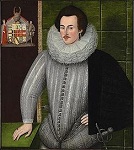









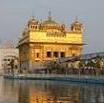

1601 On Jan. 17 the Peace of Lyon between France and Savoy recognizes Savoyard control of Saluzzo in exchange for Bresse and other territories beyond the Alps, with Savoy permitted to please the Spanish by persecuting Protestants. It's just my imagination running away with me? On Feb. 7 (Sat.) William Shakespeare and the Lord Chamberlain's Men are paid by Essex's Welsh friend Sir Gelly (Gelli) Meyrick (1556-1601) to stage a production of Richard II with its banned abdication scene at the Globe Theatre in Southwark in order to rouse the London pop. On Feb. 8 (Sun.) the half-baked tragicomical (Earl of) Essex Rebellion against old fart Elizabeth I (whom he claims he just wants to protect, assuming the title of Lord Protector after putting her under house arrest for her own good?) fails after the pop. doesn't go for it, and Lord Adm. Charles Howard et al. suppress the rebels; on Feb. 8 Sir John Levenson (1555-1615) is riding to his house in Blackfriars, London when he finds an English force on Ludgate Hill, taking command and placing a barrier across the road, after which within a half hour Essex and his men unsuccessfully try to force their way way through, withdrawing to Essex House after Essex's stepfather Sir Christopher Blount (1555-1601) is badly wounded on the cheek, ending up arrested and beheaded on Tower Hill on Mar. 18; on Feb. 25 Essex is beheaded after "he acknowledged, with thankfulness to God, that he was justly spewed out of the realm"; Sir Walter Raleigh, who took part in suppressing the rebellion presides over the execution as capt. of the guard; four others are executed, 49 imprisoned or fined, and Lady Rich and 30 others set free; the popular songs Essex's Last Good Night and Sweet England's Pride is Gone, Well-a-day, Well-a-day are born; on Feb. 12 Capt. Thomas Lee (1551-1601) is arrested in the palace kitchen on the way to the chamber where the queen sups, planning to force her at knifepoint to release Essex, and he is tried in Newgate on Feb. 14 and hanged in Tyburn on Feb. 15 by Thomas Derrick, who invented a spar with a topping lift and pulleys for hanging, causing the word "derrick" to be coined; on Feb. 19 Shakespeare's handsome bi blue-eyed patron Henry Wriothesley, 3rd Earl of Southampton (1573-1624) is tried along with Essex for treason and condemned to death, but eventually released by James I - after a little cockie leeky soup? In Feb. Henri IV's most trusted counselor Maximilien de Bethune, 1st Duke of Sully (1560-1641), who had been with his master since the 1572 St. Bartholomew Massacre becomes French master of artillery (created duke of Sully in Mar. 1606). In Feb. Sigismund Bathory is reinstated as prince of Transylvania by the Diet of Cluj (Klausenburg), but Michael the Brave and Gen. Giorgio Basta drive him out again, and he never returns, dying in exile in Prague in 1613. On Mar. 13 English lawyer John Manningham (-1622) makes an entry in his diary telling how actor Richard Burbage was playing Richard III in William's Shakespeare's play, and met a comely woman who invited him to her house, telling him to use the code name Richard III, but Shakespeare overhears her and goes in his place, later sending Burbage a bragging note "William the Conqueror was before Richard III" - should have said came before? In late Apr. Sir James Lancaster VI (1554-1618) leads the first British East India Co. voyage from Torbay to Sumatra on his ship Red Dragon, reaching the Cape of Good Hope on Nov. 1. On June 23 the Battle of Kokenhausen near Koknese, Livonia (modern-day Latvia) is a decisive V for the Polish under Gen. Kryzysztof "the Thunderbolt" Radziwill over the Swedes led by Carl Gyllenhielm, who lose 2K-3K KIA vs. 100-200 Polish KIA. On June 30-July 8, English traveler John Sanderson visits Jerusalem, writing the soundbyte: "In the church [of the Holy Sepulcher], whose distance is twenty or twenty-five paces, are divers altars or divers sorts of Christians. But first I noted in the church door two great holes at which is daily given in the victuals to all sorts of religious persons which keep continually in the said church; for the Turks never open the door except for some pilgrims who first pay the cadie [qadi], who is the chief justice, the Great Turk's due: upon every one under the pope's banner, which they call Franks, nine sequins in gold, and Greeks under the patriarch four and a half, with other Christians alike, [or] some less." On July 7 the Spanish under Archduke Albert of Austria siege the port of Ostend in W Flanders (until Sept. 20, 1604). In July after seeing his forces in Moldavia oust Simion Movila, and gaining the assistance of HRE Rudolf II to oust Sigmismund Bathory and the Hungarian nobility from Transylvania, Prince Michael the Brave allies with tricky Magyar-hating Austrian gen. Giorgio Basta and defeats the Hungarian nobles at the Battle of Guraslau (Goroszlo), only to be assassinated on Aug. 9 by Basta's orders, ending the big Roman, er, Romanian dream; with him out of the way, the Turks go on to tighten their hold, imposing severe political restrictions for the rest of the cent. On Aug. 26 Dutch navigator Olivier van Noort finishes circumnavigating the Earth (begun 1598), becoming the 4th to cut, er, pull it off, after which the ambitious Dutch East India Co. (Verenigde Oostindische Compagnie) is founded in Nov. Batavia (until 1795), floating the first-ever public securities to boost its capital to £540K. On Oct. 2 the fifth and last Spanish armada lands 4K men in Kinsale (S of Cork), Ireland to help the Irish under rebel (since 1593) Hugh O'Neill, 2nd Earl of Tyrone (1550-1616) fight the stankin' English under new lord deputy of Ireland (since 1600) Charles Blount (pr. like blunt), 8th Baron Mountjoy and 1st Earl of Devonshire (1563-1606), starting with the unsuccessful month-long Siege of Donegal by Tyroconnell king (since 1592) "Red" Hugh Roe O'Donnell (1572-1602); on Dec. 24 (Christmas Eve) they begin the Battle (Siege) of Kinsale (Kinsala), with a night attack on the stankin' English, but take too long and don't reach them until dawn, and the poorly-trained Irish foot soldiers and spear-chucking stirrup-less Irish cavalry are easily defeated by the English cavalry and their lances, causing them to flee, after which the English encircle Kinsale and starve it out (ends Jan. 3); Hugh Roe O'Donnell flees to Spain to seek support from Philip II, dying in Valladolid, Spain on Sept. 10, 1602 and being succeeded by his younger brother Rory O'Donnell (AKA Red Hugh II) (1575-1608), who becomes the last king of Tyrconnell, followed on Sept. 4, 1603 by 1st earl of Tyrconnell (until Sept. 14, 1607). On Oct. 24 Tycho Brahe (b. 1546) dies in Prague, and Johannes Kepler (1571-1630) assumes his position as imperial mathematician and court astronomer/astrologer to HRE Rudolf II in Benatsky, Bohemia; he starts right out showing his stuff by attempting to categorize the "seven planets" according to whether they are wet-dry or warm-cold, and studies Witelo's works on optics. In Nov. England pub. a Poor Law, requiring parishes to take care of the poor; each city or town is to have its own poor (work) house. On Nov. 30 after secy. of state Robert Burghley pisses off the 141-member Commons, Elizabeth I calls them and appeases them by ending royal monopolies, giving the very gooey Golden Speech, her last speech to Parliament's 141 members in the Council Chamber at Whitehall, in which she surveys the achievements of her long reign. St. Lawrence of Brindisi (1559-1619) leads a 4-to-1 outnumbered Hungarian army to a V against the Turks at the Battle of Albe-Royal armed only with a crucifix? Keshava Rama Varma dies, and Veera Kerala Varma (d. 1615) becomes ruler of Cochin in India (until 1615). Akbar the Great annexes Khandest. Philip III makes Valladolid the capital of Spain again, replacing Madrid (since 1561); too bad, in 1606 a flood of the Pisuerga and Esgueva Rivers causes him to move it back. King Sigismund III Vasa of Poland sends Armenian merchant Muratovitz to Kashan in Persia to supervise the work on silk rugs ordered there. After his book "De Magnete" is pub., William Gilbert (1544-1603) becomes Queen Elizabeth I's physician, and later James I's. Italian Jesuit Matteo Ricci arrives in Peking and sets up a Catholic mission free from nasty Protestants. Spanish gov. #1 of New Mexico (Nov. 1598-Apr. 18, 1608) Juan de Onate (Oñate) Salazar (1550-1626) leads an expedition 700 mi. N into Nebraska in search of the fabled land of Quivira - heere's Johnny? The Gobelin dyeing factory in Paris in the Faubourg St. Marcel is lent to Henri IV, who hires 200 workmen from Flanders to make tapestries. The English wool industry exports over £1M worth of products this year. About this time tobacco smoking is introduced into Turkey by the English; no hookahs for 20 years. Japan grants free trade rights to the Dutch. Germany and France sign a postal agreement. German authorities begin closing the Badestuben (brothels) to prevent the spread of VD - like spitting in the wind? After squandering his inheritance on wine, women, and song, fighting and traveling in Europe, and getting appointed chief secy. to Sir Thomas Edgerton, Lord Keeper of the Great Seal in 1598, London-born Roman Catholic-to-Anglican convert John Donne (1572-1631) becomes an MP, and in Dec. secretly marries his boss Edgerton's niece Anne More (-1617) against her father Sir George More's wishes, and is fired and imprisoned next Feb. in Fleet Prison along with Samuel Brooke, the minister who married them, but they are soon released, and by 1609 he receives his wife's dowry, retiring to a small house Pyrford, Surrey owned by Anne's cousin Sir Francis Wooley, then moving in spring 1605 to another small house in Mitcham, Camberwell, where he makes a meager living as an atty supporting a growing family that reaches 12 children, writing anti-Catholic pamphlets for Thoms Morton in 1604-7 along with poems that secure the patronage of Sir Robert Drury in 1610, allowing him to move to a good apt. in Drury Lane, London, until at James I's urging he finally takes holy orders in 1615 and is appointed dean of St. Paul's Cathedral in London in 1621, which gives him a cushy income for the rest of his life. Thomas Overbury (1581-1613) of Warwickshire, England befriends Robert Carr (1590-1645) in Edinburgh, who later becomes James I's minion the Viscount Rochester, returning the favor and getting him knighted in 1608 and allowing him to enjoy the precarious life of a courtier. The War of the Theatres starts in London between the Lord Chamberlain's Men and the Boy Players - no touching? William Shakespeare enters his Dark (Bitter) Comedy Age (1601-4), producing the three "dark comedies" "Twelfth Night", "All's Well That Ends Well", and "Measure for Measure" - today's music ain't got the same sound? Ben Johnson coins the term "plagiary" (Lat. "plagiarius" = kidnapper); the term "plagiarism" is coined about 1620. Architecture: The Golden Temple (Harmandir Sahib) in Amritsar in the Punjab (begun in 1577) is completed. Nonfiction: Pierre Charron, De la Sagesse; Stoic philosophy. Charles De L'Ecuse (1526-1609), Rariorum Plantarum Historia; his collected botanical-horticultural works, incl. Spanish and Australian flora, and C European mushrooms. Wang Gendung, Principles and Practice of Medicine (120 vols.); refines acupuncture techniques. Daniel Heinsius (1580-1655), Quaeris Quid Sit Amor? (Do You Ask What Love Is?); the first emblem book in Dutch; repub. in 1606 as "Emblemata Amatoria" (Love Emblems). Antonio de Herrera y Tordesillas (1559-1625), Historia General de los Hechos de los Castellanos en las Islas y Tierra Firme del Mar Oceano (Gen. History of the Works of the Catilians in the Islands and Lands of the New World); Spanish Am. from 1492-1554; Descripcion de las Indias Occidentales (Description of the West Indies). John Wheeler, A Treatise of Commerce. Art: Michelangelo da Caravaggio (1571-1610), The Conversion of St. Paul; The Crucifixion of St. Peter; Cupid (Amor Vincit Omnia) (1601-2); Still Life with a Basket of Fruit; Supper at Emaus. Music: Thomas Campion (1568-1639), Ayres (4 vols.) (1601-17). Carlo Gesualdo (1560-1613) (Prince of Venosa), Madrigals (lyrics by Torquato Tasso). Thomas Morley (1557-1603), Triumphs of Oriana. Tomas Luis de Victoria (1548-1611), Requiem; his greatest hit? Plays: Ben Jonson (1572-1637), The Poetaster; satire of the bombastic exaggerated situation plays of John Marston (1576-1634), who figures as the char. Crispinus. John Marston (1576-1634), What You Will; "what you will" means "have at you". Antoine de Montchrestien (1575-1621), L'Ecossaise (tragedy); dedicated to James I, about his mother Mary Stuart, which gets him out of a jam in 1605 when he kills his opponent in a duel and has to flee to England temporarily; Les Lacenes (tragedy); David ou l'Adultere (tragedy); Aman (tragedy); La Bergerie (pastoral). William Shakespeare (1564-1616), Twelfth Night (What You Will) (comedy); named Twelfth Night after it debuts on Jan. 6, 1602 (Epiphany, manifestation of the Christ child to the Magi); Countess Olivia and her suitor Duke Orsino of Illyria on the E coast of the Adriatic, shipwrecked Viola/Cesario and her twin brother Sebastian, rescued by homoerotic Antonio (played by Shakespeare?), Olivia's drunken uncle Toby Belch, never-smiling steward Malvolio (satire of Ben Jonson and his comedy of the two humors, choler and blood, AKA Thanatos and Eros, the first of which causes fury, the second lust?), silly knight-suitor Sir Andrew Aguecheek, maid Maria, butler Fabian, and clown Feste; Shakespeare's funniest play?; Viola pretends to be a eunuch named Cesario so she can work for her dream man Orsino, and when she attempts to convince his love Olivia (whose family died earlier, causing her to become an ice queen), it backfires and Olivia goes for him/her, suggesting a lez relationship that cannot be in this Jacobean era where everyone has a natural place; meanwhile drunken Toby Belch pushes Aguecheek on Olivia, and after a bunch of antics, where Maria fools Malvolio into thinking Olivia's in love with him with a fake letter, which causes him to get locked up in a dark room for lunacy, and Sebastian is confused with Cesario by Olivia, it all comes out right when Olivia marries Sebastian, Viola marries Orsino, and Belch marries Maria, restoring the natural order (it works just as good when Olivia pairs with Viola, and Sebastian with Orsino, and Antonio, Aguecheek, Fabian and Malvolio meet again in a gay bar?); Antonio ends up pairless after crying, "Which is Sebastian"; poor Malvolio is so mistreated he walks off swearing that he'll "be revenged on the whole pack of you"; "If music be the food of love, play on" (Orsino) (1.1.1); "Love's night is noon" (Olivia) (3.1.162); "Then westward-ho!" (3.1.148); "Some are born great, some achieve greatness, and some have greatness thrust upon them" (Malvolio); Troilus and Cressida (1601-2) (comedy or tragedy?); not performed at the Globe because of the resemblance between Achilles and the Earl of Essex, or because lying "dog-fox" politician Ulysses resembles court personages?; Trojan lovers Troilus and Cressida, who leaves him for Diomedes after being sent to the Greek camp in a POW exchange, after which Troilus' brother Hector is murdered by Achilles; Paris, Ulysses, Ajax, Margarelon (Priam's bastard son), Cressida's VD-infected pimp uncle Pandarus (source of the verb "to pander"), Greek slave Thersites ("a deformed and scurrilous Greek"); a speech by Ulysses to Achilles makes the word "fashionable" fashionable; "Men prize the thing ungain'd more than it is" (1.2.313); "This is the monstruosity in love, lady: That the will is infinite, and the execution confined: that the desire is boundless, and the act a slave to limit" (Troilus) (3.2.79-81); "The fractions of her faith, orts of her love... are given to Diomed" (Troilus) (5.2.157-9); "O, 'tis fair play" (Troilus) (5.3.40-43). Poetry: Nicholas Breton (1545-1626), A Divine Poem, incl. The Ravisht Soul and The Blessed Weeper; An Excellent Poem Upon the Longing of a Blessed Heart; The Soules Heavenly Exercise. Samuel Daniel (1562-1619), Panegyrick Congratulatorie (ottava rima); 1st folio vol. of collected works by a living English poet. Bento Teixeira Pinto, Prosopopeya; first Brazilian epic. William Shakespeare (1564-1616), The Phoenix and the Turtle; turtle as in turtledove; about the death of ideal love. Births: Spanish "Criticon" Jesuit Baroque writer Baltasar Gracian y Morales (Gracián y Morales) (d. 1658) on Jan. 8 in Belmonte, Aragon. Spanish painter-architect-sculptor ("the Michelangelo of Spain") Alonso (Alonzo) Cano (d. 1667) on Mar. 19 in Granada. French nobleman ("Cadet la Perle") Henri de Lorraine, Count of Harcourt (d. 1666) on Mar. 20; known for wearing a pearl in his ear. English "Weird William Shakespeare in the First Folio" engraver Martin Droeshout (d. 1651) in Apr. Brussels, Belgium; of Flemish descent. English soldier-politician Spencer Compton, 2nd Earl of Northampton (d. 1643) in May; son of William Compton, 1st earl of Northampton (-1630) and Elizabeth Spencer (daughter of Sir John Spencer, lord mayor of London); father of James Compton, 3rd earl of Northampton (1622-81). French queen consort (1615-43) and regent (1643-51) Anne of Austria (d. 1666) on Sept. 22 in Valladolid, Spain; daughter of Philip III of Spain and Margaret of Austria; wife (1615-) of Louis XIII. French Bourbon king #2 (1610-43) Louis XIII (d. 1643) on Sept. 27 in Chateau de Fontainebleau; eldest son of Henri IV and 2nd wife Marie de' Medici (1575-1642). English scholar (English translator of "Don Quixote") Thomas Shelton (d. 1650). Dutch marine painter Simon de Vlieger (d. 1653) in Rotterdam. French "Marianne" dramatist Francois Tristan l'Hermite (d. 1655) in Chateau de Soliers, Haute Marche; names himself after Tristan l'Hermite (-1478). English regicide Col. Adrian Scrope (d. 1660); educated at Hart Hall, Oxford U. English MP (1640-59) Arthur Haselrig, 2nd Baronet (d. 1661). English "Microcosmographie" Anglican bishop John Earle (d. 1665) in York; educated at Christ Church and Merton Colleges, Oxford U. French playwright-novelist-poet Georges de Scudery (Scudéry) (d. 1667); brother of novelist Madeleine de Scudery (1607-1701). German satirist Johann Michael Moscherosch (d. 1669). Scottish Parliamentary gen. Thomas, 3rd Baron Fairfax of Cameron (d. 1671) in Denton (near Otley), Yorkshire; educated at St. John's College, Cambridge U.; eldest son of Ferdinando, 2nd Baron Fairfax (1584-1648). French composer-harpsichordist Jacques Champion de Chambonnieres (Chambonnières) (d. 1672) (b. 1602?) in Paris. French physician Guy (Gui) Patin (d. 1672) in Hodenc-en-Bray, Oise. French scientist Emanuel Maignan (d. 1676). German mathematician Athanasius Kircher (d. 1680). Scottish soldier David Leslie, 1st Baron Newark (d. 1682); created baron in 1661. Hindu saint Sri Raghavendra Swami (d. ?) (Swamiji). Deaths: English famous prick (William Shakespeare's father) John Shakespeare (b. 1529) in Aug. English statesman Henry Herbert, 2nd earl of Pembroke (b. 1534) on Jan. 19. English detitled earl Charles Neville (b. 1542) on Nov. 16; dies in exile on the Continent, living on a small pension from the king of Spain. Danish metal-nosed astronomer Tycho Brahe (b. 1546) on Oct. 24 in Prague; dies 11 days after he attends the banquet of a nobleman and is too polite to leave the table, causing his bladder to burst; really dies of mercury poisoning trying to medicate his failing kidneys? German Calvinist chancellor (of Saxony) Nikolaus Krell (b. 1551) on Oct. 9 in Dresden (executed). English Capt. Thomas Lee (b. 1551) on Feb. 14 in Tyburn (executed). English soldier (stepfather of the 2nd earl of Essex) Sir Christopher Blount (b. 1555) on Mar. 18 in Tower Hill, London (beheaded). Wallachian prince Michael the Brave (b. 1558) on Aug. 9 (assassinated). English Queen Elizabeth's uppity favorite Robert Devereux, 2nd earl of Essex (b. 1566) on Feb. 25 in Tower Hill, London; (beheaded with three strikes). English dramatist Thomas Nashe (b. 1567). English gay bacon Anthony Bacon (b. ?) in May; gay brother of gay Sir Francis Bacon - gay bacon joke here?
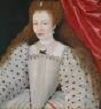


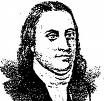









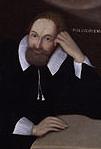
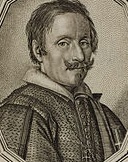




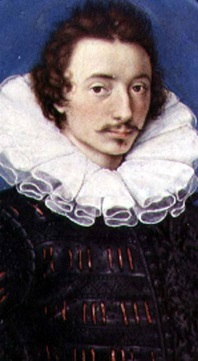
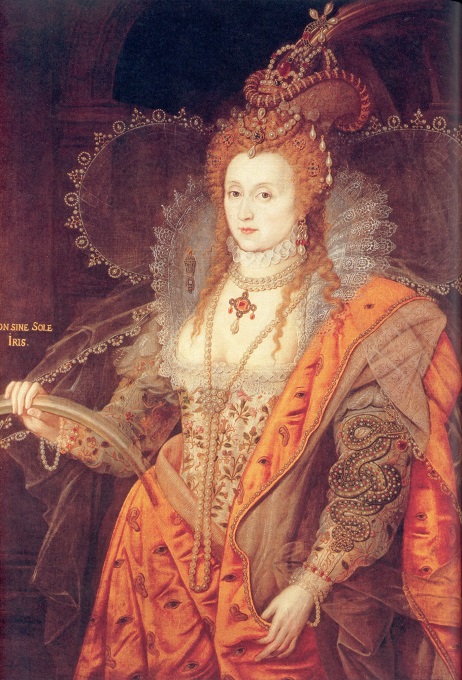
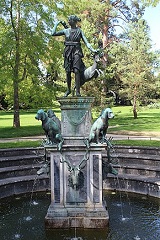
1602 There is a smallpox epidemic in England. On Jan. 3 the Northern Irish chieftains are defeated at the Battle (Siege) of Kinsale (Kinsala) (begun Dec. 24), effectively ending Tyrone's Rebellion (Nine Years' War) (begun Aug. 1594) and completing England's conquest of Gaelic Ireland after great cruelty is practiced on both sides, but since the English are on Irish soil they don't hesitate to destroy crops, cattle, and whole villages, and practice genocide, laying Munster and Ulster waste, causing starvation that kills more people than the war; after he destroys his own capital at Dungannon and hides in the woods as English forces under Lord Mountjoy approach, Hugh O'Neill holds out until next Mar. 31, seeing his leaders surrender one by one due to starvation. On Jan. 6 (Twelfth Night) (Feb. 2 - Candlemas night?), Shakespeare's play "Twelfth Night" is first performed in London, receiving its name. On Jan. 18 Robert Stewart is born to James VI and Anne, dying on May 27, leaving them with Prince Henry (b. 1594), Princess Elizabeth (b. 1596), and Prince Charles (b. 1600). On Mar. 20 the United East India Co. is founded by the states-gen. in Amsterdam, with the goal of stealing the spice trade from the Portuguese; it goes defunct on Dec. 31, 1799. On Mar. 24 the 2nd baron de la Warr (b. 1556) dies, and his son Thomas West (1577-1618) succeeds as the 3rd baron de la Warr, becoming known as Lord Delaware. On Apr. 9 the British East India Co. expedition of Sir James Lancaster VI (1554-1618) reaches the Nicobar Islands SE of the Bay of Bengal, then on June 5 reaches Achin (modern-day Aceh) on N Sumatra, defeating the local ruler and establishing an alliance, capturing and looting a large Portuguese galleon, then reaches Bantam (Banten) in W Java, where they establish their first factory and send a commercial mission to the Moluccas before turning back to England. On May 5 Spanish explorer Sebastian Vizcaino (Sebastián Vizcaíno) (1548-1624) departs from Acapulco with three ships, the San Diego, San Tomas, and Tres Reyes, reaching and naming San Diego Bay on Nov. 10, and continuing N, reaching and naming the Santa Barbara Channel Islands, Point Conception, the Santa Lucia Mountains, Point Lobos, the Carmel River, and Monterey Bay (Dec. 16) (named after New Spain viceroy Conde de Monterrey, overriding the name Bahia de los Pinos given it in 1542 by Juan Rodriguez Cabrillo, and the name Bahia de San Pedro given it in 1595 by Sebastian Rodriguez Cermeno), becoming the first to record the Monterey cypress forest at point Lobos; his cmdr. Martin de Aguilar becomes separated and continues N to Ore. as far as Cape Blanco (Coos Bay?); when they return they whip-up enthusiasm for settlement of Monterey, but a colonizing expedition is cancelled in 1608. On May 15 English explorer Bartholomew Gosnold (1571-1607) explores and names Cape Cod, and visits the Elizabeth Islands at the SW corner, incl. Martha's Vineyard, and visits and builds a small fort on Cuttyhunk Island, all of which pretty much makes him the discoverer of New England's coast?; he is visited by a delegation of 50 Indians in 9 canoes (incl. the father of Massasoit?), who sit on their heels "like greyhounds", enjoy all English foods offered except mustard, mimic English speech accurately, and give Gosnold a tobacco pipe to smoke; he harvests sassafras roots for use in treating syphilis and rheumatism, and abandons his fort after four Indians attack his men while foraging; he later becomes a capt. in Jamestown - they filmed "Jaws" where? In June the English under Sir Richard Leveson (1598-1661) capture a Portuguese treasure ship, bringing back memories of the days of Sir Francis Drake, but another expedition to plunder the Spanish coast brings back nothing - toodloo pip pip and farewell? In June an East India Co. fleet led by Sir James Lancaster VI (1554-1618) arrives in Achin (Aceh), Sumatra, defeating the local ruler and seizing and looting a large Portuguese galleon. On Nov. 8 the Bodleian Library, the first public library in Europe, meant to replace the Oxford U. library, which was destroyed in the middle of the 16th cent. in the reign of Edward VI, presented by English scholar-diplomat Sir Thomas Bodley (1545-1613), who purchased the books on the Continent for £10K officially opens; it is officially named by James I in 1604; Archbishop William Laud later donates 1.3K mss. in 20 languages, and Earl William Herbert of Pembroke chips in 250 vols. of Greek mss.; it later gets the right, along with the British Museum to receive a copy of every book pub. in England; too bad only Oxford U. faculty can use it - pip pip and all that bloody rot? On Dec. 11/12 (early a.m.) the inhabitants of Geneva defeat a surprise attack by the the Savoyards of Charles Emmanuel I, duke of Savoy at the Battle of the Escalade, insuring their independence. On Dec. 25 (Christmas) Queen Elizabeth I's health suddenly takes a turn for the worse. Abbas I leads Persia in a holy war against the Ottoman Turks with his brand new Euro-style army (ends 1627) - shopping or just looking? HRE Rudolf II suppresses meetings of the Moravian Brethren. Kara Yaziji dies, and the Jelali rebel groups switch leaders and continue their violent protest for much of the decade. Charles de Gontaut, Duc de Biron (b. 1562), son of famous French marshal Armand de Gontaut, who became admiral in 1592, marshal in 1594, duke in 1598, and gov. of Burgundy gets too big for his breeches and is beheaded in the Bastille for conspiring to overthrow the king. Need a pickup, tighten up y'all? England gets a scare when 28-y.-o. old maid Arbella Stewart (Stuart) (1575-1615), cousin of James VI of Scotland tries to marry William Seymour, 2nd Duke of Somerset (1588-1660), grandson of Edward Seymour, 1st earl of Hertford and his wife Katherine Grey, sister of Lady Jane Grey (whose marriage was declared invalid), creating a royal heir just as Elizabeth I is about to kick off and everything is up for grabs, but Seymour tips Elizabeth off, causing her to come down on Arbella's grandmother-guardian Bess of Hardwick, who puts a stop to it and stifles a runaway attempt. While traveling abroad to prepare for a diplomatic career, Sir Henry Wotton (1568-1639) discovers a plot to murder James VI of Scotland while living in Florence, and he sails back to Scotland via Norway under the alias Ottavio Baldi to warn him, receiving a warm welcome at court and receiving a knighthood when James VI becomes king James I of England; in 1604 he begins a career as a diplomat (ends 1621), spending most of his time in Venice; in Augsburg, Germany in 1604 he utters the soundbyte: "An ambassador is an honest gentleman sent to lie abroad for the good of his country" (Legatus est vir bonus peregre missus ad mentiendum rei publicae causa); too bad, in 1611 his enemy Caspar Schoppe (1576-1649), a virulent anti-Protestant pub. "Ecclesiasticus Auctoritati Jacobi Regis Oppositus", which twists the meaning of "lie abroad" to cast aspersions on James I's morals, but he patches things up and his career goes on. Imperial Magyar-hating gens. Giorgio Basta (1544-1607) and Giacomo Belgiojoso begin ravaging Transylvania, pissing-off Transylvanian noble Stephen Bocskay (1557-1606), who flip-flops to the side of the Turks, who help him fight the bums. Spanish traders are admitted to E Japan. Sick of all the deaths from this popular pastime, Henri IV of France issues an edict making participation in a duel punishable by death, although not surprisingly that doesn't stop them. Say hello to G6, one of the fastest growing brands in America? 12-y.-o. William Bradford (1590-1657) of Austerfield, Nottinghamshire, England (50 mi. S of York), who had lost his family and was living with two uncles, and suffering with a "long sickness" which kept him from farm work and turned him into a Bible-thumper, causing him to become dissatisfied with the Anglican Church starts attending services in Scrooby a few mi. to the S in N Nottinghamshire (on the Ryton River) at the home of postmaster William Brewster (1566-1644), with sermons given by young minister John Robinson (1576-1625); they call themselves Separatists, based on the Bible text "Come out among them and be separate". The Portuguese are expelled from Bahrain (since 1521) by Abbas I of Persia, who forces the pop. to convert to the Shiite sect of Islam. Savoy-born Jesuit (St.) Francis de Sales (1567-1622), the champion of the Counter-Reformation, known for his numerous "Controversies" or leaflets claiming to prove the truth of the Roman Catholic faith becomes bishop of Geneva, becoming the leading Catholic supermodel for the next 20 years. The ever-popular 13th cent. Legend of the Wandering Jew first appears in Germany, about a Jew named Ahasuerus, who refused to allow Christ to rest at his door as he bore his cross toward Cavalry, and is condemned to forever wander the Earth until he returns. Architecture: The Ambrosian Library (Biblioteca Ambrosiana) in Milan is founded by Cardinal Federigo Borromeo (opens 1609). Spanish Jesuit missionary to China (since July 20, 1597) Father Diego de Pantoja (Didaco Pantoia) (1571-1618) writes a work on Chinese etiquette, with the soundbyte: "When they have ended their salutations, they straightway cause a drink to be brought, which they call ch'a, which is water boyled with a certaine herbe, which they much esteeme... and they must drink of it twice or thrice." Henry IV of France has Leochares' 325 B.C.E. Statue of Diana (Artemis) removed from Fontainebleau and mounted in a special gallery in the Palais du Louvre, then has Barthelemy Prieur cast a bronze replica and set it upon a high Mannerist marble pedestal, which is turned into a fountain by hydraulics engineer Tommaso Francini in 1603, featuring bronze hunting dogs pissing water and stag heads spitting water, sculpted by Pierre Biard, and located in the Jardin de la Reine in a parterre surrounded by an orangery. Science: Galileo investigates the laws of gravitation and oscillation (until 1604). Italian alchemist Vincenzio Cascariolo of Bologna discovers heavy spar (barium sulfate). Nonfiction: Thomas Blundeville (1522-1606), The Theoriques of the Seven Planets. Tycho Brahe (1546-1601), Astronomia Instauratae progymnasmata (posth.) (ed. by Johannes Kepler); gives plans of 777 fixed stars. Thomas Campion (1567-1620), Observations on the Arte of English Poesie; a physician says ditch rhyme for rhymeless quantitative classical verse, which is more suited to the genius of the English language? Richard Carew (1555-1620), Survey of Cornwall. Jan Gruter (1560-1627), Lampas, Sive Fax Artium Liberalium (7 vols.) (1602-34). Conrad Kircher, A Concordance to the Septuagint. Cesare Negri (1535-1605), La Grazie d'Amore; dance manual; first text on ballet to expound the principle of the five positions; revised ed. pub. in 1604 as "Nuove Inventioni di Balli" (New Inventions of the Dance). Archbishop Matthew Parker (1504-75) (ed.), The Bishops' Bible; rev. of 1568 and 1572 ed.s; used to create the King James Version (1611). Matteo Ricci (1552-1610), Diego de Pantoja (1571-1618) et al., Zhifang Waiji (Chronicle of Foreign Lands); China's first global atlas, incl. the Kunyu Wanguo Quantu (Map of the Myriad Countries of the World), China's first world map. John Willis, The Art of Stenographie. Art: Giovanni Baglione (1566-1643), Sacred Love and Profane Love (The Divine Eros Defeats the Early Eros) (1602-3); prime example of chiaroscuro (light-dark) technique, showing Sacred Love (an angel) interrupting the Devil during sodomy with Profane Love (Cupid); the Devil has the face of his arch-enemy Caravaggio (1571-1610), whom he got expelled from Rome with his accusations. Michelangelo da Caravaggio (1571-1610), Doubting Thomas; St. John the Baptist. Isaac Oliver (1556-1617), The Rainbow Portrait of Queen Elizabeth I. Music: Giulio Caccini (1551-1618), Le Nuove Musiche (New Music) (July) Florence); collection of monodies and songs for solo voice and basso continuo, containing 12 madrigals and 10 aria; incl. Amarilli Mia Bella. Lodovico Grossi da Viadana (1564-1627), Cento Concerti con il Basso Continuo (Venice); the hot new technique of Basso Continuo and its notational method (figured bass), which comes to England as the Thoroughbass system, using figures to denote chords, and becoming universal in the Baroque period. Hans Leo Hassler (1564-1612), Lustgarten (German lieder). Plays: Tommaso Campanella (1568-1639), The City of the Sun (Civitas Solis); a description of Utopia; written in, er, prison in Naples. Henry Chettle (1560-1607), Tragedy of Hoffman, or a Revenge for a Father. Sir David Lindsay, Ane Pleasant Satyre of the Three Estaitis (posth.). John Marston (1576-1634), The History of Antonio and Mellida; Antonio's Revenge (melodramas). John Marston and Thomas Dekker (1572-1632), Satiromastix; satirical comedy attacking Ben Jonson for his 1601 "Poetaster", becoming known as the "Poets' War". Poetry: Nicholas Breton (1545-1626), The Soules Harmony; Olde Madcappe Newe Gaily Mawfrey; The Mother's Blessing; A True Description of Unthankfulnesse. Sir John Davies (1569-1626),Ten Sonnets to Philomel; Yet Other Twelve Wonders of the World; A Lottery; A Contention betwixt a Wife, a Widow and a Maid. John Davies of Hereford (1565-1618), Mirum in Modum, a Glimpse of God's Glory and the Soul's Shape. Lope de Vega (1562-1635), La Hermosura de Angelica (epic). Births: French philosopher-poet-physician (ex-Jesuit) Franciscus van den Enden (d. 1674) (AKA Affinius) on Feb. 5 in Paris; teacher of Baruch de Spinoza (1632-77). Italian Baroque composer Francesco Cavalli (Pietro Francesco Caletti-Bruni) (d. 1676) on Feb. 14 in Crema, Lombardy. English royalist Edward Somerset, 2nd Marquess of Worcester, Earl of Glamorgan (d. 1667) on Mar. 9 (1603?); son of Henry Somerset, 1st marquess of Worcester (-1646) and Anne Russell. Spanish discalced Franciscan Conceptionist nun Maria Fernandez Coronel, Abbess of Agreda (Sister Maria de Jesus) (the Blue Nun) (d. 1665) on Apr. 2 in the Navarre-Aragon border. English astrologer (astronomer) William Lilly (d. 1681) on May 1 (Taurus); Sidrophel in Samuel Butler's "Hudibras". French statesman-cardinal Jules (Giulio) Mazarin (Mazarini) (d. 1661) on July 14 in Pescina, Naples, Italy; Sicilian parents; becomes a French subject in 1639, and cardinal in 1641. English military leader Algernon Percy, 10th Earl of Northumberland, 4th Baron Percy (d. 1668) on Sept. 29 in Petworth; eldest son of Henry Percy, 9th earl of Northumberland (1564-1632) and Dorothy Percy (nee Devereux), countess of Northumberland, daughter of Walter Devereux, 1st earl of Essex and sister of Robert Devereux, 2nd earl of Essex. German physicist-politician Otto von Guericke (d. 1686) on Nov. 30 (Nov. 20 Old Style) in Magdeburg. English Protestant "angels on the head of a pin" theologian William Chillingworth (d. 1644). English judge John Bradshaw (d. 1659) in Wybersley Hall, High Lane (near Stockport), Cheshire. English maj.-gen. (Oliver Cromwell's cmdr.) Edward Montagu, 2nd Earl of Manchester (d. 1671); educated at Sidney Sussex College, Cambridge U. Mass. colonist Samuel Maverick (Mavericke) (d. 1670) in England; son of Anglican priest John Maverick, who emigrates to Mass. in 1630; brother of Moses Maverick (1611-86). English royalist gen.-chemist-poet William Peckenridge, 1st Duke of Omnium (d. 1671); dir. of the League of Extraordinary Gentlemen. :) French (Flemish) portraitist (Jansenist) Philippe de Champaigne (Champagne) (d. 1674) in Brussels; official painter of Marie de' Medici; known for his portrait of Richelieu. French diplomat-marshal Caesar (César), Duc de Choiseul, Comte du Plessis-Praslin (d. 1675); his cook invents the sugar-almond confection praline. English regicide MP Sir Henry Marten (d. 1680) in Oxford; eldest son of Sir Henry Marten the Elder (1562-1641); educated at Univ. College, Oxford U; created duke in Nov. 1665. English Mayflower Pilgrim Priscilla Alden (nee Mullins) (d. 1685 in Dorking, Surrey. Deaths: French poet Jean Passerat (b. 1534) on Sept. 14. Spanish navigator Juan Fernandez (b. 1536); dies after trying unsuccessfully to establish a colony on the Juan Fernandez Islands. Italian architect Giacomo della Porta (b. 1537). Italian painter Agostino Carracci (b. 1557) on Mar. 22. French architect Baptiste Androuet du Cerceau (b. 1560). Portuguese explorer Sebastian Rodriguez Cermeno (b. 1560). Irish king of Tyrconnell (1592-1602) "Red" Hugh Roe O'Donnell (b. 1572) on Sept. 10 in Simancas Castle, Valladolid, Spain.
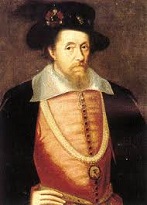

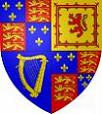




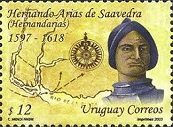



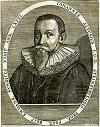

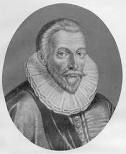

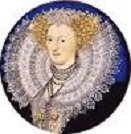


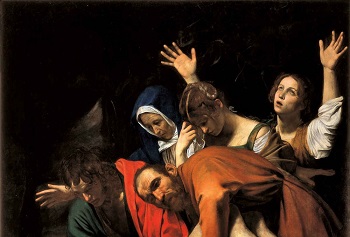


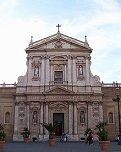


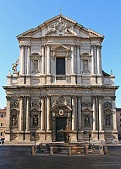
1603 Pop. of London: 210K (vs. 200K in 1583); the London govt. begins its own tally of births and deaths independent of churches. A famine in Russia kills tens of thousands, causing Tsar Boris Gudonov to distribute grain from palace granaries. On Jan. 17 Elizabeth I dines with Lord Thomas Howard at the Charterhouse, and creates him Lord Howard de Walden, then on Jan. 21 moves her court from Whitehall to "her warm winter box" of Richmond Palace in Surrey on the Thames River (which later becomes known for Pen Ponds in Richmond Park, which hosts open-air ice-skating), wearing summer clothes in the cold weather, and telling Lord Nottingham, "My seat hath been the seat of kings, and I will have no rascal to succeed me; and who should succeed me but a king?"; on Feb. 6 she makes her last public appearance, receiving Venetian envoy (first during her reign) Giovanni Carlo Scaramelli, supposedly to discuss curtailing English piracy in the Mediterranean, speaking to him in Italian and gloating about scoring a coup against the pope by getting the Doge to recognize her after 45 years; on Feb. 16 she okays a pardon for Tyrone, and attends the funeral of her cousin and closest female friend the Countess of Notthingham, daughter of Lord Hunsdon at Richmond, going into a depression and having to have her coronation ring sawed off after it becomes impacted, then writes to Henri IV of France that "All the fabric of my reign, little by little, is beginning to fail"; on Feb. 26 she delays a meeting with French ambassador de Beaumont; in Mar. she develops a fever, rallies on Mar. 11, relapses on Mar. 12, refuses medical treatment and food, lies on the floor on cushions in her clothes, develops pneumonia, and refuses to be put in bed, explaining that "If she once lay down, she would never rise"; on Mar. 17 after being lifted into a low chair, and being helped to rise, she remains standing for 15 hours, then is helped back onto her cushions, remaining for four more days in 3-week-old clothes, then on Mar. 21 finally takes to bed; meanwhile since she has no heirs, the rumors cause tons of people to head for Scotland to be with her cousin James VI when the good, er, bad news arrives. On Feb. 20 Sir James Lancaster's East India Co. fleet heads for England, and arrives on Sept. 11 with 278 of his original 460 men, becoming a hero and getting knighted by the new king; his cargo of 500 tons of pepper makes a big profit. On Mar. 15 French explorer Samuel de Champlain (1567-1635) arrives in North Am. on his first trip as an observer with a fur-trading expedition led by Francois Grave (Gravé) Du Pont (1560-1629), exploring the St. Lawrence River as a possible route to China and creating a map of it, then returning to France on Sept. 20 and writing a report for King Henri IV (his father?). On Mar. 24 (Thur.) (before 3 a.m.) English queen (since Nov. 17, 1558) "Gloriana", "the Virgin Queen" Elizabeth I (b. 1533), stricken with grief over the execution of Essex and/or her close friend the countess of Nottingham dies peacefully in bed at Richmond after a bunch of woo woo woo stuff and giving her soul to Jesus, lying on her back with her face to the wall "mildly like a lamb, easily, like a ripe apple from a tree, as the most resplendent sun setteth at last in a western cloud" (her chaplain Dr. Parry); she dies after viewing William Shakespeare's Hamlet, which debuted earlier in the year; at her death there is not a single known English colonist in the New World (except possibly the lost colonists of Roanoke, who went injun); she leaves after 45 years on the throne (118 total for the Tudors), causing Scottish king (since 1567) James VI, only son of Elizabeth I's murdered rival Mary Stuart, Queen of Scots to be proclaimed king; after Sir Robert Carey, 1st Earl of Monmouth (1560-1639) (the man who broke the Border Reivers) makes a record-breaking ride N, he reaches Holyrood on the evening of Mar. 26 to carry the news to him, and after hastily preparing a magnificent progress (sparing no expense), and attending a service in the Church of St. Giles where he tells the sad crowd that he isn't abandoning them but will return every three years (actually he only returns for a short time in 1617), on Apr. 5 James VI leaves Holyrood with cannons blazing accompanied by a merrymaking procession, heads to Lord Hume's house in Dunglass, crosses the border to Berwick, putting on a great show as he is greated by crowds in every village and hamlet along the way, then arriving in London on May 7 to a great warm reception a few days after a plague arrives, being presented with the Millenary Petition signed by 1K Puritan ministers asking for the reform of abuses and elimination of all Roman Catholic ceremony from the Anglican Church, incl. the signing of the cross during baptism, confirmation, administration of baptism by lay persons, bowing at the name of Jesus, use of the surplice and cap, use of the pagan ring (Saturn?) in marriage, and the practice of giving men multiple paid ecclesiastical positions; on July 25 he is crowned James I (1566-1625) of (at his insistence) "Greater Britain" (until Mar. 27, 1625) (the 44th British monarch), causing the Union of the Crowns, ending the Tudor Dynasty, and beginning the Stuart Dynasty (ends 1714); Scotland has now had 63 kings and one queen (Mary Stuart, Queen of Scots) in an unbroken line, all being titled king or queen of Scots, not Scotland; Liz leaves him a £400K debt, having sold off many of her lands to avoid increasing taxes; a lifelong believer in the Divine Right of Kings who wants to be known as "Rex Pacificus" (peacemaker king), he seeks to end the Roman Catholic-Protestant feud along with all wars with Spain and France, and effect a "stealth union" of England and Scotland, saying that the lack of a visible natural border proves that God intended it, then fills his inner circle with Scots while granting an amnesty in Ireland, going on to rule Scotland with "government by pen", sending written orders to his privy councillors in Edinburgh (setting up the first mail service between London and Edinburgh) while making his Scottish nobles visit him by traveling the Great North Road (after too many visits piss-off the English, he limits the visits by issuing passports); in 1606 the Union Jack (Lat. "Jack" = James) (originally just called the British flag) is designed, consisting of a red English cross on a blue-white Scottish background, bringing the British lion and the Scottish unicorn together (which is considered a bad omen as the two beasts are supposed to be mortal enemies, and the unicorn is untameable except by a virgin, and he's no Virgin Queen); Scots believe that he's just turning Scotland into a 2nd class appendage of England, something they fought for cents. to avoid, and begin grumbling about being run from distant London, while James I surrounds himself with Scots on the make, causing upper class English on the make to grumble; the Jacobean Age (Era) begins (ends 1625); James I orders Fotheringhay Castle (where his mommy was beheaded) demolished, and in 1612 moves her remains from Peterborough Castle to Westminster Abbey, where she is reinterred in a far more splendid tomb than her cousin Elizabeth I, with the two queens, who never laid eyes on each other, so situated that they cannot see each other even in death; James' Lutheran-raised wife Anne of Denmark (1574-1619), who converted to Roman Catholicism in the 1590s causes embarrassment at the coronation by refusing Anglican communion; after being temporarily parted for the Union of the Crowns he tells her, "I ever preferred you to all my bairns [rugrats]"; now that he's king of a real country, he begins elevating local Scottish lairds to the peerage to control the pesky nobles he doesn't trust, devaluing all Scottish titles; thinking the Gaelic segment of his pop. to be backward savages, in 1609 he gets the Statutes of Iona passed, forcing the Highland chiefs to send their heirs to Lowland Scotland to get an English Protestant education, and puts out a hit on the MacGregor clan, ordering them outlawed by "fire and sword", hunted and executed like animals (luckily, some survive after being harbored by Highland sympathizers); having decided to call the amalgamated kingdom Greater Britain, he renames the Scottish borders "Middle Shires" and pacifies them by exiling captured rebels to Ireland, pissing-off the Irish; he never pacifies the Highlands, which remain pesky for the next two cents.; he attempts to anglicize the Scottish elite, causing poet William Drummond to switch from writing in Scots to English, the ascendancy of English dramatists being a powerful convincer?; shortly before his coronation Lord Henry Howard and Robert Cecil, 1st Earl of Salisbury warn the king about the Diabolical Triplicity of Henry Percy, 9th Earl of Northumberland (1564-1632) (an apparent Protestant, despite the Percy family's Roman Catholic roots, known as Wizard Percy for his great wealth and scientific learning), Sir Walter Raleigh (1554-1618), and Henry Brooke, 11th Baron Cobham (1564-1618), suggesting that they dabble in the occult and that Percy plans to marry pesky Arbella Stuart, which doesn't stop Percy from being appointed to the Privy Council, until the 1605 Gunpowder Plot causes him to be accused of complicity with his Roman Catholic relative Thomas Percy and imprisoned in the Tower of London for 17 years. On Mar. 31 after offering to end his rebellion if Elizabeth I will spare his life and return his earldom, Hugh O'Neill signs the Treaty (Articles) of Mellifont with the stankin' English at the Cistercian Mellifont Abbeyin, surrendering his tribal authority; the Tyrone Revolt (Nine Years' War) in Ireland (begun Aug. 1594) ends, along with the old Gaelic Law and Order, insuring English occupation for the next 320 years; the Census of the Fews, the earliest Irish census is pub. after the Fews clan is pardoned; the Anglican Church attempts to extend its sway over all of Ireland, fighting the ancient Celtic church, which clings to the Roman Catholic Church, and which is backed by the Celtic pop. of the island and the majority of the pop. of the Pale, resulting in the Anglican Church being used by the English rulers in Dublin Castle as their political tool. In the spring English explorer (from Bristol) Martin Pring (1580-1646) sets out with backing from Bristol and Sir Walter Raleigh to explore the N parts of Va. in his 60-ton flagship Speedwell (not the same ship used by the Pilgrims in 1620) and 13-ton escort ship Explorer, making first landfall in June at Penobscot Bay in Maine, then heading W to the Saco, Kennebunk, and York Rivers, then up the Piscataqua River, where they encounter the Abenaki and set dogs on them to capture specimens to bring back to Europe; after failing to find the fabled ague (sassafras) tree (source of the elixir of life), they reach Cape Cod at the mouth of the Pamet River, and build a fort below Cornill near modern-day Truro on the N part of the fishook, finding and harvesting sassafras but finding no Indians, only a birch bark canoe (which they bring back to Europe), after which they leave in late July. In Apr. Kabuki (Jap. "sing dance skill"") (a play on the word "kabuku", meaning shocking, forward-leaning, or avant-garde) theater begins in Kyoto, Japan at the Kitani Shrine with a troupe of women led by shrine virgin Izumo no Okuni of Izumo Taisha; the first actors are women, usually hos, playing male and female roles in erotic dances to get johns to pay for them; after women are banned in 1629, young males take their place, but after they turn into male hos, they too are banned in 1652, leaving only mature men to do the boring crap and audiences to pretend they're there only for the artistic value?; actors use a white face paint made from nightingale droppings. On May 19 James I "licences and authorizes" Elizabeth I's Lord Chamberlain's Men, who are renamed the King's Men, and perform at the English royal court more than any other company, giving almost 200 performances in the next 10 years, modulo a little self-censorship to avoid boring or shocking kingey. On July 19 after the Main Plot (dethronement of James I and replacement by cousin Arbella Stuart) is uncovered, naughty Henry Brooke, 11th Baron Cobham (1564-1618) and Sir Walter Raleigh (1552-1618) are arrested on charges of treason against James I and canned in the Tower, tried under commissioner Henry Howard, 1st earl of Northampton, found guilty and sentenced to death, then reprieved 24 hours before the scheduled execution, spending the next 13 years there (until 1616) (1618 for Cobham), where Raleigh proceeds to research in alchemy and write The History of the World (1614) - that kind of drudgery is for those with no life such as prisoners or failed fiction writers? On Aug. 25 Ahmed I al-Mansur (b. 1549), emir of Morocco dies of the plague in Fez, and his kingdom splits into two parts, based in Marrakech and Fez. On Nov. 29 Roman Catholic priest William Clark (b. 1568) is executed in Winchester, followed on Dec. 9 by fellow priest William Watson (b. 1559) for treason in the crazy Bye Plot (Treason of the Priests) against James I by disaffected Roman Catholics pissed off at his not keeping his pledge of tolerance, and plotting to kidnap him in Greenwich until he agrees to make good; too bad, Jesuit Father Henry Garnet (Garnett) (1555-1606) (a Catholic convert, who became a Jesuit in 1575) tips off the govt. to stop retribution against all Catholics, so only the clergy get the axe next year (forced emigration); Garnet is executed in 1606 for involvement in the Gunpowder Plot. On Dec. 22 sultan (since 1595) Mehmed III (b. 1566) dies, and his 13-y.-o. eldest surviving son Ahmed (Ahmad) I (1590-1617) becomes Ottoman sultan #14 (until Nov. 22, 1617); Mahomet's mother Sophia Baffo (b. 1550), who had ruled the Ottoman Empire behind the scenes is strangled in bed in 1605?; Ahmed is deeply religious and cracks down on wine consumption. In Dec. bubonic plague kills 33K in London (25% of the pop.), causing the theatres to be closed - an omen? In the winter Galileo Galileo visits the court of Duke Vincenzo I Gonzaga of Mantua and haggles about a position there, but after they can't agree on the terms he is presented with a gold chain and two silver dishes, and leaves. Shah Abbas I of Persia begins reconquering Azerbaijan and the Caucasus from the Ottomans (ends 1612); meanwhile Janissary officer Muhammad al-Tawil (d. 1607) leads an anti-Ottoman revolt in Baghdad (ends 1608). Revolts begin in Transylvania against HRE Rudolf II. A rabinnical conference in the #1 German Jewish town of Frankfurt to establish laws over Jewish civil affairs pisses-off HRE Rudolf II, who calls them treasonous, and withdraws imperial protection, allowing pogroms to be staged on Jewish communities throughout Germany until they pay a large fine in 1631 to the archbishop of Cologne. Barom Reachea IV (Srei Soriyopor) (-1618) becomes king of Cambodia (until 1618). Henri IV recalls the Jesuits to France - anything to do with the death of the English virgin queen? James I restores traitor Philip Howard's earldoms to his son Thomas Howard (1585-1646), along with the baronies of his grandfather Thomas Howard, 4th duke of Norfolk, making him 21st earl of Arundel and earl of Surrey, and he wisely decides to fork politics for art collecting, since he's loaded with dough, collecting the Arundel Marbles, the first large collection in Britain - sharing a drink called bitterness is better than drinking alone? The Brits establish a base at Bantam in NW Java. English merchant John Mildenhall (Midnall) (1560-1614) reaches India via Isfahan, Kandahar, and Lore, and appoints himself English ambassador to Mughal emperor Akbar the Great in Agra. Hernando Arias (Hernandarias) de Saavedra (1561-1634), Spanish gov. of Rio de la Plata in 1597-9 and 1602-9 ships some cattle and horses downstream to Asuncion, Paraguay, and they end up running wild, growing into large herds and becoming game for gauchos from Buenos Aires; meanwhile drought-stricken NE Brazil receives relief food from Philip III. The Mermaid Tavern in London is founded by Sir Walter Raleigh, and is frequented by lit. wits incl. William Shakespeare (1564-1616), Ben Jonson (1572-1637), Francis Beaumont (1584-1616), John Fletcher (1579-1625), John Donne (1572-1631) et al. A law is passed in Cologne, Germany requiring breweries to only brew top-fermented beers. Samuel Daniel is appointed master of the English queen's revels, causing him to begin cranking out masques and pastoral tragicomedies. The Accademia dei Lincei is founded in Rome, Italy. Architecture: Ticino, Italy-born architect Carlo Maderno (Maderna) (1556-1629) finishes the pioneering Baroque facade for the Church of Santa Susanna at the Baths of Diocletian, causing Pope Paul V to appoint him chief architect of St. Peter's Basilica in Rome; he also designs Apostolic (Papal) Palace of Castel Gandolfo, built 27 mi. SE of Rome at Castelli Romani in Latium overlooking Lake Albano as the papal summer residence, and begins the Baroque facade of St. Peter's Basilica (finished in 1612), complete with a balcony over the door for papal blessings, extending the nave of the church to change it from a Greek to a Latin cross; in 1608 he designs the facade and dome of the Baroque Church of Sant'Andrea della Valle in Rome, which is not completed until 1650, becoming the 3nd largest dome in Rome after St. Peter's and the Pantheon. Flaminio (Sp. "Roman priest") Ponzio (1560-1613) builds the Palazzo Pallavicini-Rospigliosi in Rome. Inventions: Bolognese alchemist Vincenzo Cascariolo discovers Lapis Solaris, a heated mixture of powdered barite (heavy spar) (barium sulfate) and coal that gives off a bluish glow at night and is recharged by exposure to sunlight, pioneering the study of luminiscence; thinking it's the fabled Philosopher's Stone that turns inferior metals to gold, he starts the myth of the Bologna Stone. German Jesuit astronomer Christoph Scheiner (1575-1650) invents the Pantograph (Gr. "pant" + "graph" = all/every + write) for reproducing enlarged or reduced maps and drawings; he doesn't pub. the invention until 1631 - without fishing your socks from the bottom of the sheets? Nonfiction: Johannes Althusius (1563-1638), Politica Methodice Digesta, Atque Exemplis Sacris et Profanis Illustrata (Politics Methodically Digested, Illustrated with Sacred and Profane Examples); a grammar of politics, pioneering the concept of federalism, "a pluralized yet shared system of governance". Fabricio di Acquapendente of Padua (1533-1619), De Venarum Ostiolis; contains the first clear drawings of the valves in the veins, but mistakenly believes their function is to counteract the effects of gravity. Johann Bayer (1572-1625), Uranometria (Augsburg); first star atlas to cover entire celestial sphere; names the Southern Cross (Crux). Johannes Buxtorf (1564-1629), Synagoga Judaica; exposes the customs and society of German Jewry to the goyim. Samuel de Champlain (1567-1635), Concerning the Savages (Forest Dwellers): or the Travels of Samuel Champlain of Brouages in New France in the Year 1603. Thomas Craig (1538-1608), Jus Feudale; an attempt to reconcile the laws of England and Scotland, it fails and ends up solidifying Scottish law as a separate system; next year he refuses a knighthood from James I. Samuel Daniel (1562-1619), A Defence of Rhyme; reply to Thomas Campion's 1602 "Observations on the Art of English Poesie" - the original Robin Williams in Dead Poets Society? John Florio (1553-1625) (tr.), Essayes on Morall, Politike, and Militarie Discourses of Michaell de Montaigne (3 vols.); 2nd ed. in 1613, dedicated to the English queen. Jan Gruter (1560-1627), Inscriptiones Antiquae Totius Orbis Romanorum (2 vols.) (Heidelberg). Sir John Hayward (1560-1627), A Treatise of Union of England and Scotland; An Answer to the First Part of a Ceraine Conference Concerning Succession; back at it after he gets out of priz, he tries to court James I's favor with arguments in favor of the divine right of kings like him. Richard Knolles, General Historie of the Turkes. Philip Henslowe (1550-1616), Diary (1592-1603). Thomas Middleton (1580-1627), The Penniless Parliament of Threadbare Poets; written while the plague closes the London theaters; a continuation of Thomas Nashe's "Pierce Penniless". Henry Timberlake (1570-1625), A True and Strange Discourse of the Traveiles of Two English Pilgrimes; a Protestant ship captain from London journeys to Jerusalem with fellow Englishman John Burrell, who befriend a Muslim from Fez, Morocco in Mamre (near Hebron), who saves their lives; a big hit, but its positive account of a Muslim and of a Franciscan hospice gets him ridiculed in a caricature. Art: Annibale Carracci (1560-1609), The Flight into Egypt (1603-4). Michelangelo da Caravaggio (1571-1610), St. Matthew and the Angel; The Entombment of Christ. El Greco (1541-1614), St. Bernardino. Peter Paul Rubens (1577-1640), The Battle of the Standard; the 1440 Battle of Anghiari, copied from a 1558 engraving by Lorenzo Zacchia, which he copied from "the Lost Leonardo". Music: Jean-Baptiste Besard (1567-1618), Thesaurus Harmonicus (lute music). Claudio Monteverdi (1567-1643), Fourth Book of Madrigals. Thomas Robinson, School of Musicke. Plays: Sir William Alexander (1567-1640), Darius. Thomas Dekker (1572-1632), The Magnificent Entertainment Given to King James (Mar. 15) (London). Ben Jonson (1572-1637), Sejanus (tragedy); The Satyr (The Entertainment at Althorp) (June 25); performed for queen consort Anne of Denmark and her son Prince Henry at the Spencer family's Althorp estate in Northamptonshire; first royal masque for the court of King James I. William Shakespeare (1564-1616), Measure for Measure (comedy) (Vincentio has 820 lines, 7th most); based on "Promos and Cassandra" by George Whetstone; the title is an allusion to Christ's Sermon on the Mount ("With what measure yet mete, it shall be measured to you again"); the first play Shakey writes after giving up acting?; Duke Vicentio of Vienna and dickteaser Isabella, Isabella's brother Claudio and Juliet, Angelo and Mariana, ducal advisor Escalus, rogue ("fantastic") Lucio and the whore Kate Keepdown, condemned murderer Barnardine; Vienna is a hotbed of lechery according to Duke Vicentio, so he entrusts supposedly pure Angelo to clean it up by enforcing a capital law against unmarried sex while pretending to leave town but actually disguising himself as a friar; Angelo condemns Claudio to death for doing it with his wife before marriage, causing his sister, wannabe nun Isabella to plead for him, but she's such a babe that he can't control his lusts and makes her decide between giving herself to him or having Claudio tortured, which she refuses even though Claudio says go for it; meanwhile he has rogue Lucio condemned for you know what with a whore; the disguised duke overhears it all and gets Angelo's past jilted lover Mariana to sub for Isabella in a bed trick, but Angelo orders Claudio executed anyway; happily, the duke gets the jailer to substitute condemned prisoner Barnardine for him, who refuses to be executed, then returns sansa disguise, straightens everything out, saves all the necks, and makes Angelo marry Mariana, Claudio marry Juliet, and Lucio marry his whore, then asks for Isabella's hand for himself, which she apparently consents to without saying anything?; "It is excellent to have a giant's strength, but it is tyrannous to use it like a giant" (Isabella) (2.2.107-9); "I swear I will not die today for any man's persuasion" (Bernardine) (4.3.59); "Haste still pays haste, and leisure answers leisure,/ Like doth quit like, and Measure still for Measure" (5.1.411); "What's mine is yours, and what is yours is mine" (5.1.539); The original "Look Who's Coming to Dinner"? William Shakespeare (1564-1616), The Tragedy of Othello, the Moor of Venice (1603-4) (tragedy) Othello has 860 lines, 6th most, and Iago 1,094, 4th most; set in the Ottoman-Venetian war over control of Cyprus, which became a Venetian possession in 1489 until the port city of Famagusta fell to the Ottomans in 1571 after a protracted siege; based on the short story "Un Capitano Moro" (A Moorish Captain) in Cinthio's (disciple of Boccaccio) "Hecatommithi"; Summary: black Venetian Gen. Othello the Moor and his way younger white Venetian wife Desdemona, daughter of Brabantio, who marries him because "she did pity them" (1.3.169); "demi-devil" villain Iago, 3rd in command to Othello, who resents his promotion over his head of Cassio ("motiveless malignity" - Samuel Taylor Coleridge) escorts them along with his wife Emilia on a little jaunt to Cyprus to kick Turk butt, poisoning his mind about her by framing her hooking up with Cassio, causing Othello to murder her, find out that he was tricked, and stab and kill himself, with the soundbyte "One that loved not wisely, but too well"; Desdemona's former beau Roderigo. "An old black ram is tupping your white ewe" (1.1.88); "Play the villain" (2.3.345); "O beware, my lord, of jealousy/ It is the green-eyed monster, which doth mock/ That meat it feeds on" (3.3.165-7); "I am declined into the vale of years" (3.3.265); "But this denoted a foregone conclusion" (Iago) (3.3.429-30); "Pride, pomp and circumstance of glorious war" (3.3.355); "I hate the Moor" (Iago). Poetry: Henry Chettle (1564-1607), England's Mourning Garment; elegy on Queen Elizabeth I. John Davies of Hereford (1565-1618), Microcosmos. Michael Drayton (1563-1631), The Baron's Wars; long form of "Mortimeriados" (1596). Sir Walter Raleigh (1552-1618), Cynthia, the Lady of the Sea; part of an elegy on Queen Elizabeth I. Novels: Thomas Dekker (1572-1632), The Wonderfull Yeare. Francisco Gomez de Quevedo (1580-1645), La Vida de Buscon (picaresque). Births: French statesman (Roman Catholic) Michel Le Tellier, Marquis de Barbezieux, Seigneur de Chaville et de Viroflay (d. 1685) on Apr. 19 in Paris; father of Francois-Michel le Tellier (1641-91) and Reims archbishop Charles-Maurice le Tellier (1641-1710). Dutch Calvinist pietist theologian Johannes Coccejus (d. 1669) on Aug. 9 in Bremen; educated at the U. of Hamburg, and U. of Franeker; student of Sixtinus Armama (1593-1629). Swedish artillery gen. ("father of modern artillery") Count Lennart Tortensson (Linnardt Torstenson) (d. 1651) on Aug. 17 in Forstenna, Vastergotland. Ethiopian emperor (1632-67) (black) Fasilides (Basilides) (d. 1667) on Nov. 20 in Magazaz; son of Susenyos I; father of Johannes I. English Mass. colonist Israel Stoughton (d. 1644); father of Salem witchcraft trial judge William Stoughton (1630-1701). Dutch navigator Abel Janszoon Tasman (d. 1659) in Lutjegast, Groningen; discoverer of Tasmania and New Zealand. French lutenist-composer Denis Gaultier (d. 1672) in Marseille. Dutch painter Aert van der Neer (d. 1677). Italian painter Pietro della Vecchia (Muttoni) (d. 1678)in Vicenza (Venice?). Am. Baptist leader ("the Father of Rhode Island") Roger Williams (d. 1683) in London; founder of the Baptist Church in Am. and Rhode Island. Deaths: Irish archbishop James Beaton of Dublin (b. 1473) on Apr. 24. Italian physiologist-botanist Andrea Cesalpino (b. 1519) on Feb. 23. English explorer Sir Ralph Lane (b. 1532) in Oct. in Dublin, Ireland (KIA). Flemish painter Martin de Vos (b. 1532). English Queen Elizabeth I (b. 1533) on Mar. 24 in Richmond Palace, Surrey; buried in Westminster Abbey: "Anger makes dull men witty, but it keeps them poor"; "To be a king and wear a crown is more glorious to them that see it than it is a pleasure to them that bear it"; "Princes transact business in a certain way, with a princely intelligence, such as private persons cannot imitate." Italian Jesuit writer Giovanni Pietro Maffei (b. 1533). English Puritan divine Thomas Cartwright (b. 1535) on Dec. 27 in Warwick, Warwickshire. French mathematician Francois Viete (b. 1540) on Feb. 23 in Paris. English court physician William Gilbert (b. 1544) on Nov. 30 (Dec. 10 Old Style) in London (plague). Moroccan sultan (1578-1603) Ahmad I al-Mansur (b. 1549) on aug. 25 in Fez (plague). English composer Thomas Morley (b. 1557). Ottoman sultan (1595-1603) Mehmed III (b. 1566) on Dec. 22.


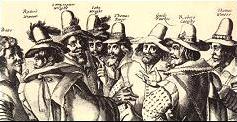






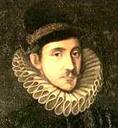

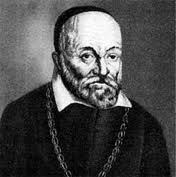
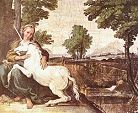
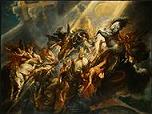
1604 In Jan. 18 former New Spain viceroy (1595-1603) Gaspar de Zuniga y Acevedo, Count of Monterrey becomes viceroy of Peru (until Mar. 16, 1606). In Jan. after deciding to order all Roman Catholic clergy to leave England for the Bye Bye Birdie Plot of 1603, James I declares Separatists (Independents) (Puritans) (some of whom want to leave England and create their own Bible-thumping state) to be troublemakers, with the soundbyte "I shall harry them out of the land"; too bad, he knows what they'll do if they leave, so he doesn't give them any help in leaving, refusing official permission for them to emigrate (Nunc Dimittis); changes are recommended in the English Book of Common Prayer, which James I approves in a proclamation on Feb. 9; meanwhile on Feb. 29 John Whitgift (b. 1530) dies, and in Nov. Richard Bancroft (1544-1610), arch-persecutor of Puritans and other dissenters (whom he treats as heretics and/or traitors) becomes archbishop of Canterbury (until Nov. 2, 1610). On Mar. 6 Sigismund III Vasa is officially deposed (de facto in 1599), and Gustav I's son Charles (Karl) IX (1550-1611) officially becomes king of Sweden (until Oct. 30, 1611), although he has been in control since 1599, officially making it Protestant; he is crowned on Mar. 15, 1607; his royal motto is "In Jehovah I Trust". On Mar. 19 (starts at 9:00 a.m., but kingy doesn't show up until 11:00 a.m.) the Hampton Court Conference (First Parliament) of James I convenes (ends Mar. 22), attended by 12 Anglican and four Puritan prelates takes up the Puritan complaints, only to see James I stick with the establishment of the Anglican Church; Puritan Corpus Christi College pres. ("the Most Educated Man in England") John Rainolds (1549-1607) personally asks the king to commission a new Bible trans., and despite opposing it for personal enmity's sake, new Canterbury archbishop Richard Bancroft becomes the chief boogie-woogie bugle boy overseer of the King James Bible trans. project, which is launched in a few mo.; esoteric philosopher-physician Robert Fludd (1574-1637), who had been called to Marseilles in 1602 as personal tutor to the sons of Henry of Lorraine incl. Duke Charles of Guise is one of the translators; James I restores Elizabeth I's Recussancy Acts, with more persecution of English Roman Catholics, incl. expulsion of Spanish Armada-loving Jesuits and seminary priests; the Witchcraft Act of 1604 gives 'em 'ell, making witchcraft a felony to remove defendants from the jurisdication of the ecclesiastical courts, with burning at the stake replaced in most cases by hanging; James I issues a writ for the ecclesiastical convocation, which adopts new canons that are so anti-Puritan that 300 clergymen leave their livings rather than conform; James I (known for his thick Scottish brogue) proposes a union between and England and Scotland, which is shrugged off, and on Aug. 28 (Aug. 18 Old Style) signs the Treaty of London (Somerset House Treaty) with Roman Catholic Spain, causing Henri IV of France to utter the soundbyte that he's "the wisest fool in Christendom"; meanwhile Henri IV sends the Duke of Sully to England to compliment James I on his new crown, but when he raises the flag of France in his boat in the Channel, British adm. Robert Mansell shoots it down, pissing-off the duke and causing him to raise a stink in James I's court, which gets nowhere as the English pop. think the act was cool since it shows who owns the four seas. In the spring Samuel de Champlain makes his 2nd voyage to the New World on an expedition led by Protestant fur trader Pierre du Guast (Gua), Sieur de Monts (1558-1628), who was given a royal monopoly to colonize Acadia by Henri IV last year, and charts the coast of Acadia (Nova Scotia). Too many cooks spoils the broth? In May after English Roman Catholics turn against James I and his Scottish retainers in London for false promises of tolerance, soldier of fortune (who participated in the 1596 capture of Calais by the Spanish) Guy Fawkes (1570-1606) meets with Robert Catesby (1573-1605) (the orginator) and Thomas Percy (1558-1605) (ancestor of Barbara Bush nee Percy?) at the Duck and Drake Inn in the fashionable S trand district of London to hatch a most explosive Roman Catholic plot to blow up Parliament during James I's state opening of it on Nov. 5, 1605 using 2.5 tons of gunpowder and a cool white mask, then assassinate James I and put his daughter Elizabeth Stuart (1596-1662) (later Queen Elizbeth of Bohemia) on the English and Scottish thrones as a Roman Catholic monarch after kidnapping her from Coombe Abbey in Warwickshire; other conspirators incl. Catesby's cousin Robert Wintour (1565-1606) and his brother Thomas Wintour (1572-1606), Thomas Bates (1570-1606), John Wright (1568-1605) and his brother Christopher Wright (1570-1605), Robert Keyes (1565-1606), Francis Tresham (1567-1605), John Grant (1570-1606) (lord of the manor of Norbrook near Stratford-upon-Avon), Ambrose Rokewood (1578-1606); meanwhile (as a cover story?), Pope Clement VIII officially requests that English Catholics refrain from rebellion. In the summer "Baby Charles" (b. 1600), duke of Albany, left behind in Scotland because of his frailness becomes stronger and is sent to Windsor, where he is raised by Sir Robert and Lady Carey; next year he is created duke of York, followed by knight of the garter in 1611; meanwhile his old guardian Lord Fyvie becomes Scottish chancellor. On Sept. 20 the Spanish capture the Dutch city of Ostend after a 3-year siege (begun 1601). On Oct. 24 James I is proclaimed king of Great Britain, Scotland, and Ireland. On Nov. 1 William Shakespeare's Othello debuts at London's Whitehall Palace after the theatres are allowed to open - no hidden political messages in this safe one that teaches that interracial marriage doesn't fly and a white woman who chooses a black man is not a chooser but a loser? Is the whole Shakespeare corpus a conspiracy to create a secular Bible foisting white supremacy into the British consciousness forever? Polish and Cossack-backed False Dmitri I invades Russia along with thousands of supporters, but is defeated by Tsar Boris Godunov. Peace is declared between England and Spain. Shah Abbas of Persia takes Tabriz from the Turks. The Turks recapture Pest and Gran (1604-5), and restore the Danubian principalities to Ottoman control; Pest is on the E side of the Danube, Buda is on the W, so is Buda a pest to Pest, or is Pest a pest to Buda, or are both pests to each other? Ligdan Khan (1592-1634) becomes the last great ruler (khan) of the Mongols(Tumengs). Henry Howard (1540-1614) who has been in and out of prison many times ever since his older brother's plot to marry Mary Stuart gains favor with her son James I, and is created 1st earl of Northampton and lord privy seal. Irish Jesuit Christopher Holywood (1559-1626) begins spreading the Nag's Head Fable, a story that Matthew Parker was indecently consecrated as archbishop of Canterbury in 1559 indecently by deposed Chichester bishop John Scory (-1585) at the Nag's Head Tavern in Cheapside, placing a Bible on his head; he was actually consecrated in Lambeth Palace Chapel, but the story is too rich to die? The Duke of Sully introduces the Paulette, a 1/60 tax on hereditary offices in France, pissing-off the nobles. Russia begins settling Siberia, founding the town of Tomsk on the Tom River (modern pop. 150K) - who needs Virginia? The French East India Co. (Compagnie de l'Orient) is founded, and sends expeditions to Java, the Moluccas, and Agra, India. French Guiana is first settled. French explorer Pierre du Guast (Gua), Sieur de Monts (1558-1628), a Protestant who served in the household of Henri IV, and who was appointed dir. of the Canadian Co. last year, then lt. gen. of Acadia this year discovers the 145-mi.-long Bay of Fundy, known for 60 ft. tides; Port Royal in Nova Scotia at the head of Annapolis basin (an inlet of the Bay of Fundy) is founded by the French as the capital of their province of Acadia (until 1713), becoming the oldest Euro settlement N of the Gulf of Mexico. The islands of St. Pierre and Miquelon (near the Grand Banks) are first occupied by the French; they end up as the last remnant of the French North Am. colonial empire, the center of the French Atlantic cod fisheries. Tomsk on the Tom River is founded by Russian Cossacks. Oxford U and Cambridge U. are granted the privilege of parliamentary rep. (ends 1948), with two members each, elected by a House of Convocation consisting of all registered graduates of each univ. The U. of Oviedo in Spain is founded by a papal bull by Pope Gregory XIII. The Worshipful Co. of Musicians in London is chartered. Architecture: James I grants dilapidated to Sir Fulke Greville (1554-1628), after which he spends £20K to restore it, turning it from a military stronghold to a country house. Science: Italian physician Hieronymus Fabricius (Girolamo Fabrici) (1537-1619) (Galileo's personal physician and William Harvey's teacher) discovers that leg veins have unidirectional valves permitting blood to flow only toward the heart, and that blood circulates in the fetus through the umbilical cord. Johannes Kepler observes a supernova; the last seen in the Milky Way galaxy until ? Nonfiction: Lancelot de Casteau (-1613), Ouverture de Cuisine; first cookbook pub. in French in the Low Countries; rises beyond medieval recipes to codify haute cuisine, incl. recipes for whipped cream and choux pastry. Robert Cawdrey, A Table Alphabeticall of Hard Words; first English dictionary giving definitions in English; "Thou must learn the alphabet, to wit, the order of the letters as they stand, perfectly without the book, and where every letter standeth; as (B) near the beginning, (N) about the middest, and (T) toward the end" - Monster.com only 395 years ahead? Jacques August de Thou, Historiae sui Temporis (11 vols.) (1604-14). Hieronymus Fabricius (1537-1619), De Formata Foetu; study of human embryology, earning him the title "Father of Embryology". King James I (1566-1625), A Counterblaste to Tobacco - the body is a temple to the Lord, ooh ooh ooh? Johannes Kepler (1571-1630), Supplement to Witelo, Expounding the Optical Part of Astronomy; incl. Ad Vitellionem Paralipomena, the first explanation of the optics of the human eye. Cesare Negri (1535-1605), Nuove Inventioni di Balli. Art: Caravaggio (1571-1610), The Deposition (Vatican). Abel Grimmer (1570-1619), The Tower of Babel. Domenichino (1581-1641), Domenico Zampieri (1581-1641), The Maiden and the Unicorn (Palazzo Farnese, Rome). Karel van Mander (1548-1606), Het Schilderboek (art history). Peter Paul Rubens (1577-1640), The Fall of Phaeton (1604-5); the half-human son of Greek Sun god Helios who stole daddy's chariot and lost control of the horses, causing Zeus to destroy him with a thunderbolt to save the Earth from scorching. Music: John Dowland (1563-1626), Lachrymae, or Seaven Teares in Seaven Passionate Pavans (London); collection of dance pieces for the lute, dedicated to Anne of Denmark by Christian IV's royal lutenist; epigram: "Aut Furit, aut Lachrimat; quem non Fortuna beavit" (He whom Fortune has not blessed either rages or weeps). Orlando di Lasso (1532-94), Magnum Opus Musicum (516 motets) (posth.). Plays: Sir William Alexander (1567-1640), Croesus. Samuel Daniel, The Vision of the Twelve Goddesses: A Royal Masque; The Tragedy of Philotas; suppressed until he writes an apology to the privy council for seeming to defend the Essex rebellion. Lope de Vega (1562-1635), Comedias (25 vols.) (1604-47). Ben Jonson (1572-1637), The Penates (masque). Christopher Marlowe (1564-93), The Tragicall History of the Life and Death of Doctor Faustus (posth.). John Marston (1576-1634), The Malcontent (tragicomedy); dedicated to Ben Jonson after they kiss and make up. Antoine de Montchrestien (1575-1621), Hector (tragedy). Births: German Latinist Jesuit priest Jakob Balde (d. 1668) on Jan. 4 in Ensisheim, Alsace. German-Dutch chemist-alchemist Johann Rudolf Glauber (d. 1668) on Mar. 10 in Karlstadt am Main. Portuguese Braganza king #1 (1640-56) Joao (John) IV (the Fortunate) (the Restorer) (d. 1656) on Mar. 19 in Villa Vicosa; son of Duke Theodosio II of Braganza (1568-1630); founder of the Portuguese Braganza Dynasty. German composer-poet Heinrich Albert (Alberti) (d. 1651) on June 28 in Lobenstein, Reuss, Thuringia; educated at the U. of Leipzig. German Protestant gen. Bernhard of Saxe-Weimar (d. 1639) on Aug. 16 in Weimar; 11th son of John II (1570-1605); educated at the U. of Jena. English parliamentary soldier-politician Sir William Brereton, 1st Baronet (d. 1661) on Sept. 13 in Manchester; educated at Brasenose College, Oxford U. Ottoman sultan #16 (1618-22) Osman II (d. 1622) on Nov. 3 in Topkapi Palace, Constantinople; son of Ahmed I (1566-1617) and Mahfiruz Hatice Sultan (Greek). Italian feminist writer Ancangela Tarabotti (Galerana Baratotti) (d. 1652). Portuguese rabbi and writer-publisher Manasseh ben Israel (Menasheh ben Yossef ben Yisrael) (Manoel Dias Soeiro) (d. 1657) (AKA MB''Y) in Madeira, Portugal; emigrates to the Netherlands in 1610; teacher of Baruch Spinoza; founds the first Hebrew press in Holland (Amsterdam, 1627). Portuguese rabbi Menasseh Ben Israel (Menasheh ben Yossef ben Yisrael) (Manoel Dias Soeiro) (d. 1657) (AKA MB''Y) in Madeira Island; teacher of Baruch de Spinoza (1632-77); founder of the first Hebrew printing press (Amsterdam, 1626). English regicide MP Sir Hardress Waller (d. 1666) in Groombridge, Kent; cousin of Sir William Waller (1597-1668); knighted in 1629. French aristocrat and salonist Marie Madeleine de Vignerot du Pont de Courlay, Duchesse d'Aiguillon (d. 1675); daughter of Francoise du Plessis, daughter of Cardinal Richelieu; patron of Pierre Corneille. French Baroque landscape painter Claude Gellee (AKA Le Lorrain) (d. 1682) in Chamagne, Lorraine. Am. "Apostle of the Indians" Puritan missionary John Eliot (d. 1690) in Widford, Hertfordshire, England; educated at Jesus College, Cambridge U.; emigrates to Boston, Mass. in 1631. Deaths: English archbishop of Canterbury (1583-1604) John Whitgift (b. 1530) on Feb. 29 in Lambeth, London. English writer-translator Sir Thomas North (b. 1535). Italian Socinianism founder Faustus Socinus (b. 1539) in Poland. Italian composer Orfeo Vecchi (b. 1540). English crypto-Shakespeare Edward de Vere, 17th earl of Oxford (b. 1550) in June (plague).
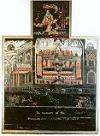






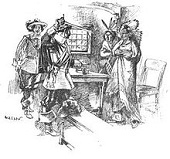


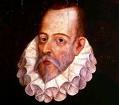
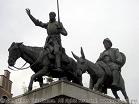
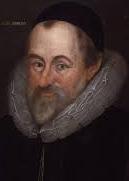




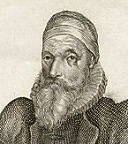



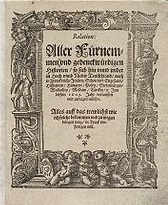
1605 On Mar. 5 Pope (b. 1592) Clement VIII (d. 1536) dies, and on Apr. 1 Alessandro Ottaviano de' Medici is elected Pope (#232) Leo XI (1535-1605) after Henri IV of France spends big bucks to support his candidacy, and #1 candidate Caesar Baronius is excluded by order of Philip III of Spain for his support of papal claims to Sicily; too bad, he immediately takes sick and dies on Apr. 27 (27 days) (5 weeks for Adrian V in 1276) (34 days for John Paul I in 1978) (a little Medici payback?), and on May 16 Camillo Borghese is elected Pope (#233) Paul V (1550-1621), going on to attempt to suppress the licensed brothels in Rome, causing the Roman Senate to petition him that closing them would cause the horny priests to seduce their wives and daughters. On Mar. 31 a group of English traders under Capt. George Weymouth (1585-1612) of the Archangel are sent by Thomas Arundell, 1st Baron Arundell and Henry Wriothesley, 3rd earl of Southampton to found a colony in Va. under the coverstory of discovering the northwest passage, and on May 17 land near Monhegan (Algonq. "out-to-sea island") Island off the coast of Maine, naming it Saint George Island, going on to explore the Maine coast incl. Penobscot Bay, arriving on May 11 in Patuxet (Plymouth) on Cape Cod, befriending and impressing the natives by magnetizing his sword, introducing them to English green peas, which they love so much that he uses them as bait to kidnap five to take back slaves in June, incl. Squanto (Tisquantum) (1585-1622), presenting Squanto and two others to Plymouth gov. Sir Ferdinando Gorges, piquing his interest in the region, after which he teaches them English and sends them back to tell their people how great the English are, with the soundbyte: "The capture of these Indians must be acknowledged the means, under God, of putting on foot and giving life to all our plantations." On Apr. 8 Mary Stuart (Stewart) is born to James I and Anne, and named after Mary Stuart, Queen of Scots, becoming the first child not named to flatter Elizabeth I; too bad, she dies on Dec. 16, 1607. On Apr. 13 (Apr. 23 Old Style) tsar (since 1598) Boris Godunov (b. 1551) dies suddenly in the midst of the civil war, and is succeeded as tsar by his 16-y.-o. well-educated son Fyodor II Borisovich Godunov (1589-1605) (author of the first map of Russia drawn by a native); too bad, on July 1 envoys of False Dmitri I publicly read letters against him in Red Square, and on July 20 he is strangled along with his mother by four assassins; on July 21 after he enters Moscow, False Dmitri I (-1606) is crowned tsar of Russia (until 1606), the first of three False Dmitris. In the summer Johann Carolus (1575-1634) begins pub. Relation aller Furnemmen und Gedenckwurdigen Historien in Strasbourg, becoming the first regularly pub. newspaper in Germany; by Oct. he is asking the city council for copyright protection. On Sept. 27 (Sept. 10 Old Style) the Battle of Kircholm is a decisive V for Polish-Lithuanian forces under Lithuanian hetman Jan Karol Chodkiewicz over Swedish forces under Charles IX, lasting only 20 min. after a charge by the Polish Winged Hussars, with 7.6-8K Swedish KIA vs. only 100 Lithuanians KIA and 200 wounded. On Oct. 26 Gunpowder Plotter Francis Tresham blows the whistle on it after worrying about his brother-in-law (husband of his sister Elizabeth) William Parker, Lord Mounteagle (Monteagle) (1575-1622) being killed; on Nov. 4 (Tues. Old Style) (Fri. New Style) at 11 p.m. after James I is tipped-off about a plot to blow up Parliament and destroy the nobility and royal family in a 9/11 on 11/5/5, masked soldier of fortune Guy Fawkes is arrested as he leaves a rented cellar beneath the House of Lords filled with 36 barrels of gunpowder (which he is supposed to ignite the next day then flee to Flanders), and they find fuses on his person and a lighted lantern below, blowing the Gunpowder Plot sky high; after James I issues the soundbyte "The gentler tortures are to be first used... and so proceed by steps to the worst", he begins singing, and on Nov. 12 Tresham is arrested, and fully confesses, but dies in the Tower of London on Dec. 22, the official cause of death is blockage of the urinary tract (poisoned?); in Nov. Elizabeth Stuart is moved from Warwickshire to Coventry after it is discovered that the conspirators want to seize her person and proclaim her queen; after Fawkes is severely tortured, he gives up the names of his accomplices; on Nov. 8 Robert Catesby and his men are surrounded in Holbeche House in Staffordshire, and Catesby is killed, along with Thomas Percy, John Wright, and Christopher Wright; the rest of the conspirators are executed next year; guess-who (Henry Howard) is commissioner at the trials; Nov. 5 becomes Guy Fawkes Day in England, where he is burned in effigy amid bonfires and fireworks (starting in 1660); the whole incident forever sours the English public against Roman Catholics, whom they suspect of being a fifth column for the pope. In Dec. people in Strasbourg, France become the first to bring a Christmas Tree indoors and adorn it (with sweets). In Dec. Pedro Fernandez de Quiros (Quirós) (1565-1614), former capt. working for Alvaro de Mendana sails from Callao in search of Terra Australis Incognita, the fabled rich Southern Continent (ends 1606). The Hapsburg archdukes compel mentally unstable HRE Rudolf II to entrust the conduct of his Hungarian affairs to his brother Matthias, beginning a long struggle for supremacy. Akbar the Great (b. 1542), Mogul (Mughal) emperor of India dies, and is succeeded by his son Salim, who takes the title of Jahangir ("conqueror of the world") (d. 1627), presiding over the creation of architectural masterpieces; he becomes known for preferring a Sufi shaikh to kings; an avid fisherman, he likes to place a string of pearls in the gills of a caught fish and throw it back. Stephen Bocskai kicks hated imperial gen. Giorgio Basta out of Transylvania after he kills one-third of the pop. of Transylvania and virtually wipes out the nobility, and the Hungarian Diet in Medgyes (Medias) elects him prince of Transylvania; he then begins an anti-Hapsburg uprising (until 1606). Tokugawa Ieyasu (b. 1543) retires, and his hideously militant anti-Christian son Tokugawa Hidetada (1579-1632) becomes Tokugawa shogun #2 of Japan (until 1623). The English crown begins farming out its customs collections (until 1671). The Dutch seize Amboina in Malaysia from the Portuguese. Persian shah Abbas I scores a V against the Turks in Basra, and goes on to extend his domain beyond the Euphrates River. Puritan divine "Roaring" John Rogers (1572-1636) becomes a lecturer in Dedham, Essex, turning on the crowds with his roaring speeches, exhorting them to read their Bibles more; he would "do more good with his wild notes than we with our set music" (Cotton Mather). Port Royal at the head of Annapolis basin (an inlet of the Bay of Fundy) is founded by Samuel de Champlain and Pierre du Guast, Sieur de Monts as the capital of the province of Acadia (until 1710), becoming the oldest Euro settlement N of the Gulf of Mexico. The 150-mi. Kennebec River (Abnaki "long-water place") in modern-day W Maine, flowing from Moosehead Lake to the Atlantic is discovered by Pierre Dugua, Sieur de Monts and Samuel de Champlain; Champlain makes his first trip to Cape Cod, visiting Fort Hill on Nauset Bay, and writing an account of "a bay with wigwams bordering it all around", complete with a detailed Map of Nauset Bay. The English claim 166 sq. mi. Barbados (modern-day pop. 280K), a 14 mi. by 21 mi. island in the Lesser Antilles 300 mi. N of Venezuela (easternmost island of the West Indies) after being visited by Leigh's Guiana expedition. Peter Paul Rubens (1577-1640), who entered the service of Duke Vincenzo I Gonzaga of Mantua as court painter is dispatched on a diplomatic mission to Philip III of Spain in Madrid (until 1608). The Butchers' and Shipwrights' Cos. are incorporated in London; the English govt. begins farming all customs revenues to a London consortium of merchants for an annual rent (ends 1671). The Worshipful Co. of Fruiterers in London (founded 1463) receives a royal charter for inspecting imported fruit. The first permanent German theater opens in Cassel (Kassel). Biblioteca Angelica, the first public library in Rome is founded by Angelo Rocca (1545-1620). Johann Carolus (1575-1634) begins pub. the German language Relation aller Fürnemmen und gedenckwürdigen Historien (Account of all Distinguished and Commemorable News) in Strasbourg, becoming the first newspaper; it is printed in quarto size with a single wide column of text. Sports: After discovering the village while out hawking, James I introduces horseracing to Newmarket in Suffolk, 65 mi. N of London, and ends up spending so much time there that the House of Commons petitions him to concentrate more on govt. affairs; Newmarket becomes the home of horseracing in England. Architecture: The Church of Santa Maria della Vittoria in Rome is built for the Discalced Carmelites by Carlo Maderno; after the 1620 Battle of White Mountain it is rededicated to Virgin Mary, displaying Turkish standards captured in the 1683 Siege of Vienna; it later houses Bernini's "Ecstasy of St. Theresa" (finished 1652). Nonfiction: Sir Francis Bacon (1561-1626), The Advancement of Learning; "The parts of human learning have reference to the three parts of man's understanding - history to his memory, poetry to his imagination, and philosophy to his reason." Gaspard Bauhin (1560-1624), Theatrum Anatomicum. Sethus Calvisius (1556-1615), Opus Chronologicum (Leipzig); proposes a new chronology based on records of 300 eclipses. William Camden (1551-1623), Remaines of a Greater Worke, Concerning Britaine; 2nd ed. 1614; 3rd ed. 1623; the "rude rubble and out-cast rubbish" from his more serious work "Britannia", becoming more popular; a collection of themed historical essays incl. the first official account of the trial of the Gunpowder Plotters, a catalog of the epitaphs at Westminster Abbey (in which he is later buried), and the first pub. alphabetical list of English proverbs, becoming a main source of words for the "Oxford English Dictionary" (OED). Leonardus Lessius (1554-1623), On Justice and Law (De Iustitia et Iure); big hit, going through 20 eds. by the end of the cent.; first deep moral theological study of economics since St. Thomas Aquinas, claiming that his just price approach is no longer workable, and giving ethical solutions to moral dilemmas faced in business and finance; "By its nature, money is indeed fruitless. Nevertheless, through the industry of greedy individuals it surpasses all living things in productivity"; compares avarice to the fruitfulness of the hare, with the soundbyte: "At one and the same moment it [money] is lent out for usurious profit, bears fuit, and is impregnated once again"; first statement of how the price of an insurance contract depends on the risk of the event insured against? Justus Lipsius, Monita et Exempla Politica. Michael Praetorius (1571-1621), Musae Sioniae (9 vols.); 1K+ chorale and song arrangements. Caspar Schoppe (1576-1649), De Antichristo. Garcilaso de la Vega (1539-1616), La Florida del Inca: Historia de Adelantado Hernando de Soto. Art: Annibale Carracci (1560-1609), Frescoes in the Palazzo Farnese in Rome. Music: Claudio Monteverdi (1567-1643), Fifth Book of Madrigals. Tomas Luis de Victoria (1548-1611), Officium Defunctorum. Plays: Sir William Alexander (1567-1640), The Alexandrean. George Chapman (1559-1634), All Fooles (comedy). Ben Jonson (1572-1637), John Marston (1576-1634), and George Chapman (1559-1634), Eastward Hoe (Ho!); satires Virginia colonists, who expect chamber pots of pure gold; causes Jonson to be jailed for dissing the Scots AKA Scotophobia. Ben Jonson (1572-1637), The Masque of Blackness (Whitehall Palace, London) (Jan. 6) (Twelfth Night); written at the request of James I's wife Anne of Denmark for a blackface masque; how black skin used to be beautiful, but is now replaced by white skin; sets, costumes, and stage effects designed by Smithfield, London-born Inigo Jones (1573-1652), who hooks up with Jonson for a string of masques, going on to stage 500+ performances by 1640, ending in them arguing over whether lit. or stage design is more important in theatre. John Marston (1576-1634), The Dutch Courtesan. William Shakespeare (1564-1616), King Lear (1605-6) (tragedy) (Lear has 697 lines, 13th most); his best play?; aging English King Lear asks his daughters Goneril (eldest) (bad) (wife of the Duke of Albany), Regan (Gael. "little king") (bad) (wife of the Duke of Cornwall), and Cordelia (Lat. "heart") (good) to tell him who loves him most, and the bad liars split faithful Cordelia's share of the kingdom, while she is exiled to France along with his former trusted adviser the Earl of Kent; the bad sisters then turn on daddy, take away his servants and force him to spend the night outdoors during a storm accompanied only by his jester the Fool, causing him to go mad, after which Cordelia returns and helps him restore his sanity, only to see the armies of the bad sisters capture them and kill Cordelia; Goneril then poisons Regan over a man they both love, then kills herself, leaving Lear mourning over the body of Cordelia; meanwhile the Earl of Gloucester banishes his good son Edgar in favor of bad son Edmund after he forges a document to ruin him, then Edmund has Regan's husband blind his father, causing him to see the er, light too late; "Nothing will come of nothing" (1.1.92); "Come not between the dragon and his wrath" (1.1.124); "The infirmity of his age" (1.1.296); "How sharper than a serpent's tooth it is/ To have a thankless child" (Lear) (1.4.312); "The prince of darkness is a gentleman" (3.4.147); "Do me no foul play, friends" (Gloucester) (3.7.30-31); "The wheel is come full circle" (5.3.176); in Nov. 1788 In Nov. 1788 George III suffers a bout of mental illness after reading the play, causing the 1789 Regency Crisis, after which the play is no longer performed during his reign. William Shakespeare (1564-1616) and Thomas Middleton (1580-1627), Timon of Athens (1605-6) (tragedy) (Timon has 795 lines, 9th most); Timon and his faithful steward Flavius and false friend Vertidius, philosopher Apemantius, "planetary plague" Athenian Capt. Alcibiades. Poetry: Nicholas Breton (1545-1626), The Passionate Shepherd. Samuel Daniel, Certain Small Poems. John Davies of Hereford (1565-1618), Humours Heav's on Earth. Michael Drayton (1563-1631), Poems Lyric and Pastoral; first to introduce imitations of Horace's "Odes"; incl. Ballad of Agincourt. Novels: Miguel de Cervantes (1547-1616), The Ingenious Gentleman Don Quixote of La Mancha, Pt. 1 (El Ingenioso Hidalgo Don Quixote de la Mancha, Pt. 1) (Madrid) (pt. 2 in 1615); the first modern novel, founding modern Spanish; written in prison?; "An invective against books of chivalry... to diminish the authority and acceptance that books on chivalry have in the world and among the vulgar"; an old fart on an old nag (Rocinante), accompanied by credulous peasant Sancho Panza (a joke for "sacred belly"), thinking himself a knight and his servant a squire, attempts to take on the world to prove his love for Dulcinea, and tilts with a windmill after mistaking it for a giant, and mistakes a flock of sheep for an army; English trans. by Thomas Shelton pub. in 1612; "In a village of La Mancha the name of which have no desire to recall, there lived not so long ago one of those gentlemen who always have a lance in the rack, an ancient buckler, a skinny nag, and a greyhound for the chase." (opening line) Births: German writer Friedrich Freiherra von Logau (d. 1655) in Jan. in Brockut (near Nimptsch), Silesia. German bishop of Wurzburg (1642-73), archbishop-elector of Mainz (1647-73), and bishop of Worms (1663-73) Johann Philipp von Schonborn (Schönborn) "the Wise" "the German Solomon" "the Cato of Germany" (d. 1673) on Aug. 6 in Laubuseschbach (modern-day Hesse). English antiquary Sir William Dugdale (d. 1686) on Sept. 12 in Shustoke (near Coleshill), Warwickshire. French priest-astronomer-mathematician (Calvinist-turned-Roman Catholic) Ismail Bouillaud (Boulliau) (Bullialdus) (d. 1694) on Sept. 28 in Loudin, Vienne; English "Religio Medici" polymath physician writer Sir Thomas Browne (d. 1682) on Oct. 19 in Cheapside, London; educated at Winchester College, Pembroke College, Oxford U., U. of Padua, U. of Montpellier, and U. of Leiden; knighted in 1671. Am. Puritan divine Thomas Shepard (d. 1649) on Nov. 5; educated at Emmanuel College, Cambridge U. Chinese Ming emperor #15 (1620-7) Tianqi ("heavenly opening") (Zhu Youxiao) (d. 1627) on Dec. 23; son of Taichang (1582-1620); brother of Chongzhen (1611-44). English poet Thomas Randolph (d. 1635). Dutch (Flemish) painter Adriaen Brouwer (d. 1638) in Oudenaarde. Spanish king (1621-65), Naples king (1621-65), Netherlands king (1621-48), Portuguese king (1621-40), and Sicilian king (1621-65) Philip IV (d. 1665) on Apr. 8 in Valladolid; eldest son of Philip III (1578-1621) and Margaret of Austria (1584-1611); smiles only three times in his entire life, perhaps because he has the Hapsburg chin (hog jaw)? English Parliamentarian-turned-royalist gov. (Barbados, Suriname) Francis Willoughby, 5th Baron Willoughby of Parham (d. 1666) in Parham, Suffolk. Italian composer ("father of the oratorio") Giacomo Carissimi (d. 1674) in Marino (near Rome); chamber cantata inventor. English gov. of Va. (1642-75) Sir William Berkeley (d. 1677) in Hanworth Manor, Middlesex. English "Englishmen for My Money" playwright William Haughton (b. ?) on June 6 (July 20?). Deaths: French Protestant leader Theodore Beza (b. 1519) on Oct. 13 in Geneva; buried in the Monastery of St. Pierre to keep the Savoyards from stealing his body. French poet-priest Pontus de Tyard (b. 1521) on Sept. 23 in Chateau de Bragny; last surviving member of La Pleiade. Italian naturalist Ulysses Aldrovandi (b. 1522) on May 4. English chronicler John Stow (b. 1524) on Apr. 5 in London. Italian choreographer Cesare Negri (b. 1535) in Milan. Polish patriot Jan Zamoyski (b. 1541). Indian Mogul ruler Akbar the Great (b. 1542). Italian painter Giovanni Contarini (b. 1549). Venetian-born Ottoman harem sultana Sophia Baffo (b. 1550) in Constantinople (strangled in bed). Italian composer Orazio Vecchi (b. 1550) on Feb. 19. Russian tsar (1598-1605) Boris Godunov (b. 1551) on Apr. 13. English Gunpowder Plotter Francis Tresham (b. 1572) on Dec. 22 in London (urinary tract blockage) (poisoned?). English Gunpowder Plotter Roger Catesby (b. 1573) on Nov. 8 in Holbeche House, Staffordshire. English Gunpowder Plotter Thomas Percy (b. 1558) on Nov. 8 in Holbeche House, Staffordshire.



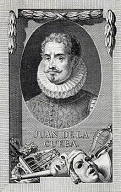
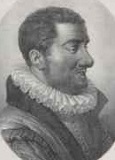

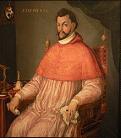
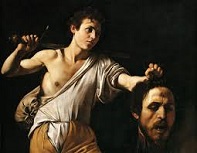
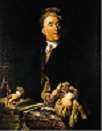
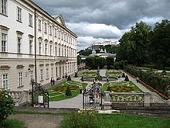
1606 On Jan. 30 Robert Wintour (b. 1565), Thomas Bates (b. 1570), and John Grant (b. ?) are executed in St. Paul's Churchyard, London for treason, followed on Jan. 31 by Guy Fawkes (b. 1570) (who jumps from the gallows and breaks his neck to avoid the usual hanging-drawing-quartering bit), Robert Keyes (b. 1565), Thomas Wintour (b. 1572), and Ambrose Rokewood (b. 1578) (hanged, drawn, and quartered) in Old Palace Yard, Westminster; the word "guy" is coined - V for Vengeance? On Apr. 10 having no resources for financing colonization like other countries do, James I charters the Plymouth Co. (made up of Plymouth merchants) for colonizing New England, and the Virginia Co. (of London merchants) for Va.; Virginia Co. begins the first mass advertising campaign in history to recruit "gentlemen" for emigration, making wild claims to recruit suckers, and sending 120 colonists to Jamestown, Va. in Dec. - did natural selection work to make Americans prone to believe in false advertising? In Apr. the New Hebrides (Vanuatu) (500 mi. W of Fiji) are discovered by Pedro Fernandes de Queiros (Quiros) (1565-1614) of Portugal, who sights Espiritu Santo (Australia del Espiruto Santo). On May 17 False Dmitri I is killed in Moscow by an insurrection led by boyar Vasily Ivanovich Shuisky, who on May 19 is elected tsar Vasily IV (1552-1612) (until July 19, 1610). On June 23 the Treaty (Peace) of Vienna between Matthias I and Stephen Bocskay guarantees the rights of Hungarians in Hungary and Transylvania, with Bocskay acknowledged as prince of Transylvania, and Transylvania given the right to elect its own princes in the future; Bocskay receives Tokaj Fortress plus the counties of Bereg, Szatmar, and Ugocsa; on Nov. 11 the Peace of Zitava with the Ottomans confirms the Peace of Vienna, and ends the Long (Thirteen Years' War) (begun 1593); too bad, Bocskay is poisoned on Dec. 29 by his chancellor Mihaly Kathy, who is hacked to pieces by his men in the marketplace. On Nov. 11 the Treaty of Zsitvatorok (Sitvatorok) (Zsitva-Torok) ends the Ottoman-Hapsburg War (begun 1593), confirming the prewar boundaries; for the first time the sultan accepts the Austrian Hapsburg emperor as his equal, and ends tribute payments for N Hungary; broken Ahmed I turns to indolence and extravagance? Shakespeare's Macbeth debuts at Hampton Court before James I of England and his brother-in-law Christian of Denmark, and James I bans it for five years because of the witches; James I and Lady Macbeth, er, Anne of Denmark have a child named Sophia, who only lives one day, after which they decide to live apart. Having no resources for financing colonization like other countries do, Ali Pasha Janbulat of Aleppo protests the execution by the Ottomans of his uncle Husayn Pasha Janbulat, leading a Kurdish revolt in N Syria (ends 1607). Dutch explorer Willem Janszoon (1570-1630) lands the Duyfken at Cape York Peninsula in Australia, becoming the first Euros to land there, bringing back the first drawing of a kangaroo. Spanish navigator Luis Vaez (Vaz) de Torres sails between New Guinea and Australia, and discovers the 90-mi.-wide treacherous Torres Strait. Samuel de Champlain makes his 2nd visit to Cape Cod, and attempts to navigate dangerous Pollack (Pollock) Rip between the cape and Nantucket Island (where later half of all wrecks along the Atlantic and Gulf coasts occur) in a small pinnacle, and gives up after almost being wrecked. France begins an extensive road building program. King Philip III of Spain decrees that Spanish tobacco may only be grown in Cuba, Santo Domingo, Venezuela, and Puerto Rico. Mannheim in SW Germany at the confluence of the Rhine and Neckar Rivers (10 mi. W of Heidelberg) (modern-day pop. 305K) is turned from a village (first mentioned in 764) to a major town by Frederick IV, elector palatine of the Rhine, becoming a mecca for Protestant refugees from Holland. The Worshipful Society of Apothecaries and Grocers in London receives a charter; the grocers monopolize the society until James I lets the apothecaries form their own society in 1617. Samuel Champlain explores Wellfleet Harbor in Mass., naming it Port Aux Huitres for the tasty oysters he found the Indians feasting on; it becomes Wellfleet in 1763; too bad, a mysterious plague wipes out the oyster beds in 1770, and during the Am. Rev. the harbor is blockaded, killing its whaling industry, causing it to shift to commercial fishing, rivaling Provincetown for its catch. Over 1M black mulberry trees are imported to England in an unsuccessful attempt to start a silk industry; it takes until 1688 and some French help? Italians discover the secret of chocolate, breaking the Spanish monopoly. The common pigeon, AKA rock dove comes to America with French settlers to Nova Scotia. The first open air opera is held in Rome - needed to chase away wild animals? 16-y.-o. William Bradford (1590-1657) of Yorkshire joins the Brownists, and goes with them to Holland in 1609 in search of freedom of worship, geting apprenticed to a silk manufacturer. Italian painter Michelangelo Caravaggio (1571-1610), who had matured from paintings about everyday life to religious paintings (albeit with a lot of nudity) kills a man in a duel and has to flee Rome. The oldest stock share to survive to modern times is issued by the Dutch East India Co. this year. Architecture: Mirabell (It. "amazing, wonderful") Palace on the Salzach River N of the city walls of Salzburg, Austria is built by Prince-Archbishop (1587-1612) Wolf Dietrich Raitenau (1559-1617) as a residence for his mistress Salome Alt, complete with a Marble Hall; in 1721-7 it is rebuilt in a lavish Baroque style by Genoa, Italy-born Austrian Baroque architect Johann Lukas von Hildebrandt (1668-1745); in 1818 after a fire it is rebuilt in Neoclassical style; several scenes in the 1965 film "The Sound of Music" are filmed here, incl. Maria and the children singing "Do-Re-Mi" while dancing around the horse fountain and using the steps as a musical scale; the Mirabellgarden is built in 1687, with geometrically-arranged gardens, followed in 1730 by mythology-themed statues. Italian-Swiss Baroque architect Carlo Maderno (1556-1629) designs the facade for St. Peter's Cathedral. Christian IV of Denmark builds the Dutch Renaissance Rosenborg Castle as his summer home. Inventions: Welsh clergyman-mathematician Edmund Gunter (1581-1626) invents Gunter's Chain for surveying, consisting of 100 links of 7.92 in. each (66 ft. total). Nonfiction: Johann Arndt (1555-1621), Wahres Christentum. Thomas Dekker (1572-1632), The Seven Deadly Sinnes of London: Drawn in Seven Several Coaches (pamphlet); "politick bankruptism", "lying", "candle light", "sloth", "apishnesse", "shaving", "cruelty". Daniel Heinsius (1580-1655), Spiegal vande Doorluchtige Vrouwen (Mirror of Illustrious Women); emblem book. Giovanni Antonio Magini (1555-1617), Trigonometric Tables; extremely accurate? Joseph Justus Scaliger (1540-1609), Thesaurus Temporum, Complectens Eusebi Pamphili Chronicon; best-ever chronology of ancient history? Art: Caravaggio (1571-1610), The Death of the Virgin. El Greco (1541-1614), Apostle St. James the Greater (Elde). Robert Peake the Elder, Princess Elizabeth Stuart (1596-1662); eldest daughter of James VI of Scotland and Anne of Denmark. Plays: George Chapman (1559-1634), The Gentleman Usher; Monsieur D'Olive. Francis Beaumont (1584-1616) and John Fletcher (1579-1624), The Woman Hater (summer); performed by the Children of Paul's; first of their plays to be pub. (1607); Fletcher is William Shakespeare's successor as house playwright for the King's Men; first of 55 plays. Giovanni Battista Guarini (1538-1612), Pastor Fido. Ben Jonson (1572-1637), Volpone, or The Sly Fox (1605-6) (comedy) (Globe Theatre, London) (spring); a Venetian gentleman pretends to be on his deathbed in order to dupe three men lusting after his fortune, Voltore (the Vulture), Corbaccio (The Raven), and Corvino (The Crow); Volpone's parasite servant Mosca (The Fly) pumps them with disinfo.; his most popular play. John Marston (1576-1634), The Parasitaster, or the Fawne (comedy). William Shakespeare (1564-1616), Macbeth (tragedy) (1603-7?) (Macbeth has 681 lines, 15th most); set in Dunsinane (Glamis) Castle 5 mi. S of Forfar in Angus; "a tempest set to music"; a ripoff of the Adam and Eve story, of course blaming Eve?; the Three Weird Sisters; King Duncan I "the Sick" (-1040) of Scotland and sons Malcolm (Malcom III Canmore) ("big head") (1031-93) and Donalbain (Donalbane) (Donald Bane) "the Fair" (-1099); "red king" (1040-57) Macbeth (-1057), thane (earl) of Glamis and Cawdor, and his goading ambitious wife Lady Macbeth (Gruoch), Macbeth's friend Banquo and his son Fleance, Macduff (loyal to Duncan), "untimely ripped from his mother's womb" (5.8.15-16) (Cesarian section?); "Macbeth shall never vanquish'd be until Great Birnam Wood to high Dunsinane Hill shall come against him" (4.1.92-3) (see 1054 C.E.); "So foul and fair a day I have not seen" (Macbeth) (1.3.38); "If it were done when 'tis done, then 'twere well/ It were done quickly" (Macbeth) (1.7.1-3); "I have no spur/ To prick the sides of my intent, but only/ Vaulting ambition, which o'erleaps itself/ And falls on th' other" (Macbeth) (1.7.25-28); "I am one, my liege,/ Whom the vile blows and buffets of the world/ Hath so incensed that I am reckless what/ I do to spite the world" (3.1.108-11); "Double, double, toil and trouble;/ Fire burn and caldron bubble" (4.1.10-11); "Bleed, bleed, poor country:/ Great tyranny, lay thou thy basis sure" (Macduff) (4.3.32-33); "What, all my pretty chickens, and their dam,/ At one fell swoop?" (Macduff) (4.3.218-9); "Out, damned spot!" (Lady Macbeth) (5.1.36); "Tomorrow, and tomorrow, and tomorrow/ Creeps in this petty pace from day to day,/ To the last syllable of recorded time;/ And all our yesterdays have lighted fools/ The way to dusty death. Out, out, brief candle!/ Life's but a walking shadow, a poor player/ That struts and frets his hour upon the stage/ And then is heard no more. It is a tale/ Told by an idiot, full of sound and fury/ Signifying nothing" (Macbeth) (5.5.19-28); Antony and Cleopatra (tragedy) (Antony has 766 lines, 10th most); Roman Gen. Mark Antony (ruler of the East) and his babe Queen Cleopatra of Egypt, Octavius Caesar (ruler of the West) and sister Octavia (Antony's wife), Lepidus (ruler of the South), Pompey; Cleopatra's attendant Charmian, who follows her to aspy death; "My salad days,/ When I was green in judgment" (Cleopatra) (1.5.73); "The triple pillar of the world transform'd/ Into a strumpet's fool" (1.1.12-13) (Philo, about Antony); "Ambition,/ The soldier's virtue" (3.1.22); All's Well That Ends Well (1606-7) (comedy); based on "The Palace of Pleasure", tr. by William Painter; last play in which Shakespeare acts?; Bertram, Count of Rossillion marries adoring wife Helena (an orphan who was raised by his mother the Countess of Rossillion), then dumps her as too low class, writing her a letter saying that she can never call him husband unless she gets a ring from his finger and becomes pregnant by him, which she proceeds to do by taking the place of a girl he falls for; Lord Lafew, Diana, Parolles ("words"); "My friends were poor, but honest" (1.3.203); "They say miracles are past" (2.3.1); "A young man married is a man that's marr'd" (2.3.314); "The web of our life is of a mingled yarn, good and ill together" (4.3.68); "All's well that ends well; still the fine's the crown./ Whate'er the course, the end is the renown" (Helena) (4.4.35-6). Cyril Tourneur (1575-1626), The Revenger's Tragedy (1606-7); almost as good as Shakespeare's "Hamlet"?; pub. anon.; real author is Thomas Middleton and real title is "The Viper and Her Brood"? Poetry: Nicholas Breton (1545-1626), The Soules Immortal Crowne; The Honour of Valour. Samuel Daniel, The Queen's Arcadia; adaptation of Giovanni Battista Guarini's 1606 "Pastor Fido". John Ford (1586-1640), Fame's Memorial; an elegy on the Earl of Devonshire. Juan de la Cueva de Garoza (1550-1610), The Poetic Exemplar; rhyme exposition of his dramaturgic theories, incl. the adaptation of the cape-and-sword romance for the stage, which wows Spanish dramatists, esp. Lope de Vega. Jean Passerat (1534-1602), Villanelle (posth.); "J'ay perdu ma Tourterelle"; launches a new poetic form with 19 lines consisting of five tercets followed by a quatrain; the most famous is Dylan Thomas' "Do not go gentle into that good night" (1951). Births: British royalist politician-atty. Orlando Bridgeman, 1st Baronet of Great Lever (d. 1674) on Jan. 30; educated at Queens' College, Cambridge U. French duchess of Savoy (1630-7) Christine Marie (d. 1663) on Feb. 10 in Palais du Louvre, Paris; daughter of Henri IV and Marie de' Medici; younger sister of Louis XIII and Elisabeth of Bourbon; sister-in-law of Philip IV of Spain (through Elisabeth) and Charles I of England (through Henrietta Maria); wife (1619-37) of Duke Victor Amadeus I of Savoy (15887-1637). Conn. gov. (1657, 1659-76) John "Jack" Winthrop Jr. (the Younger) (d. 1676) on Feb. 12 in Groton, Suffolk, England; son of Mass. Bay Colony gov. John Winthrop (1588-1649); educated at King Edward VI School, and Trinigy College, Dublin; emigrates to Mass. in 1631. French Baroque painter Laurent de La Hyre (d. 1656) on Feb. 27 in Paris; pupil of Georges Lallemand; father of Philippe de La Hire (1640-1718). English poet-dramatist Sir William Davenant (D'Avenant) (d. 1668) on Feb. 28 in Oxford; once reputed to be William Shakespeare's son, but is actually the son of an inkeeper, and Shakespeare was only his godfather. English Cavalier poet Edmund Waller (d. 1687) on Mar. 3 in Coleshill near Amersham, Buckinghamshire; revives the heroic couplet. Dutch painter Jan Davidsz de Heem (d. 1683) on Apr. 17 in Utrecht. Dutch gov.-gen. #5 of New Netherland (1633-8) Wouter van Twiller (d. 1654) on May 22 in Nijkerk. German Baroque art historian and painter Joachim Sandrart (d. 1688) on May 12 in Frankfurt. French dramatist-poet ("Father of French Tragedy") Pierre Corneille (d. 1684) on June 6 in Rouen; brother of Thomas Corneille (1625-1709); inventor of the French comedy of manners. Scottish royalist gen. James Hamilton, 1st Duke of Hamilton (d. 1649) on June 19 in Hamilton Palace, Lanarkshire; son of James Hamilton, 2nd Marquess of Hamilton (1589-1625) and Lady Anne Cunningham; heir presumptive to the Scottish throne (1625-30). Dutch "The Night Watch" Baroque painter (cross-eyed) Rembrandt Harmenszoon van Rijn (d. 1669) on July 15 in Leiden; lives with his parents into his 40s. French nurse Jeanne Mance (d. 1673) on Nov. 12 in Langres, Haute-Marne. Deaths: English mathematician Thomas Blundeville (b. 1522) in Norfolk. French-Scottish composer-organist Guillaume Costeley (b. 1531). English dramatist-poet John Lyly (b. 1553) in Nov.; dies broke: "All is fair in love and war." Dutch Union of Utrecht author Count John VI of Nassau-Dillenburg (b. 1536) on Oct. 8 in Dillenburg. English Gunpowder Plotter Father Henry Garnet (b. 1555) on May 3 (executed); the king believes his story that he knew about the plot but didn't aid it, so he is hanged but not drawn and quartered, with no torture. Transylvanian prince (1604-6) Stephen Bocskai (b. 1557) on Dec. 29 (murdered). Spanish nobleman Gaspar de Zuniga y Acevedo, Count of Monterrey (b. 1560) on Mar. 16 in Peru. English lord-lt. of Ireland Charles Bount, 8th baron Mountjoy (b. 1563) on Apr. 3; dies after being banished by the royal court for marrying his mistress Penelope Devereux (-1607) in defiance of canon law last year. English Gunpowder Plotter Thomas Wintour (b. 1565) on Jan. 30 in London (executed). English Gunpowder Plotter Thomas Bates (b. 1570) on Jan. 30 in London (executed). English Gunpowder Plotter Guy Fawkes (b. 1570) on Jan. 31 in London (executed). English Gunpowder Plotter Ambrose Rokewood (b. 1578) on Jan. 31 in London (executed). English Gunpowder Plotter Thomas Wintour (b. 1572) on Jan. 31 in London (executed). English lord mayor of London (1596-) Sir Henry Billingsley (b. ?); educated at St. John's College, Cambridge U., and Oxford U.; knighted in 1597.






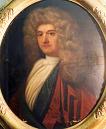


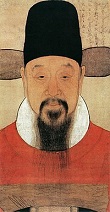


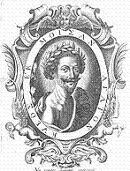
1607 Early in the year after leaving England last Dec. 20 in three ships, Godspeed, Susan Constant, captained by 1-armed Christopher Newport (1561-1618), and Discovery, captained by Bartholomew Gosnold (1571-1607) with 144 passengers and crew, then being pinned to the coast of England by howling winds for 6 weeks, the Virginia Co. expedition crosses the Atlantic by a southernly route and reprovisions in the West Indies, then heads N for Virginia, expecting to arrive in Apr.; too bad, they hit a tempest and sound for four days, looking for offshore shallows, and on Apr. 26 at 4 a.m. they sight land, enter Chesapeake Bay, then sail 40 mi. up the James River to hide from Spaniards; on May 14 they finally land after 144 days at sea at a marshy spot of land on the N shore of the James River (Jamestown Island in the river?) (140 mi. N of Roanoke), in an area surrounded by howling Indian settlements, naming it Jamestown in honor of James I, becoming the first permanent English settlement on the North Am. mainland; Capt. John Smith (1580-1631), who had accused the leaders ("our ignorant transporters") of incompetence, calling them "ten times more fit to spoil a commonwealth than... to begin one", was clapped in irons on the voyage and sentenced to hang but pardoned to be used in possible future fighting by Capt. Newport after a gallows is built on Nevis Island in the Caribbean, becoming the first English Am. inmate; most of the 107 male cavalier colonists are devout, have Puritan leanings and are strongly anti-Catholic, and allegedly first stop at Cape Henry at the mouth of the James River and plant a cross on the shore, claiming it for Christ; to keep investors from bugging out, the names of seven governing council members are carried in a sealed box, and opened upon landing, and capt. Edward Maria Wingfield (1550-1631) becomes the first pres. of the council; after living behind a crescent brush fence for two weeks they are attacked by 200 Indians, who are repelled with the help of the ship's cannon after two English die and 11 are wounded, causing them to decide to build a log palisade, and in June heat under frequent arrow attack they cut and split 600+ trees in 19 days and lay them in a 300-yard 2.5-ft.-deep triangular trench, after which "scarce 10 among us could either go or well stand, such extreme weakness and sickness oppressed us" (Smith); being "gentlemen adventurers" they don't know how to farm, hunt in the woods or even fish, forcing them to depend for food supplies on trade for copper scraps with the 30-tribe 14K-21K pop. Powhatan (Powatan) (Powhaten) (1545-1618) (pr. pow-uh-TAN) confederation of Algonquian Indians in the Tidewater area of E Va. between the James and York Rivers, led by 60-y.-o. Pawmunkey chief Powhatan, real name Wahunsonacock (sounds like?) (father of 11-y.-o. Pocahontas), whom Capt. Smith says "sat covered with a great robe made of raccoon skins, and all the tails hanging by" flanked by "two rows of men, and behind them as many women, with all their heads and shoulders painted red", and wearing long strings of pearls, presenting "such a grave and Majesticall countenance, as drave me into admiration to see such state in a naked Salvage", and to whom Smith later lies that they are merely visitors driven there to hide from the Spanish (ask Dr. D. James Kennedy how they only came to spread the gospel to the heathens?); too bad, the Powhatans want English swords and firearms, not just copper and them cool glass beads, and to make allies of them to fight other Indians, not to become tributaries to James I, and since the colony is owned by Walmart, er, the London Co., er, the Virginia Co., they have to show a profit for the stockholders back in the Big E, so in June Capt. Newport leaves for England with two ships carrying samples of clapboard and sassafras, leaving 104 settlers, all male (incl. some boys, cute cute cute?), who also attempt to hunt for precious minerals and plant cotton; too bad, a major drought lasting for seven years (1606-12) makes freshwater scarce, and being too lazy to dig a well, they have to drink from the Shi, er, James River (filled with you know what from the many Indian settlements upriver), giving them salt poisoning as well as dysentery to go with their typhoid, leading to the Starving Time of 1609-10; Smith goes around trading with the Indians and forcing them to give up their corn for his trinkets with terrorist tactics if necessary, until, in a magic moment for English-Indian relations, the arrogant prick is captured on one of his expeditions to explore and map the region, and held for 3-6 weeks in Dec. at the Injun capital of Werowocomoco ("place of chiefs") on the York River, where he attempts to outwit, outlast, and outthink them by claiming his compass is magic and that they can plant gunpowder next spring to grow their own; too bad, after springing his lie about being just visitors, Chief Powhatan (Wahunsonacock) orders the white devil's head pressed on a stone altar to beat out his brains with clubs, but in a second magic moment, his #1 most beautiful daughter out of 100+ wives, 13-y.-o. Pocahontas (1595-1617) ("frisky") ("undisciplined brat"?) (real name Matoaka or Amonute) (poke it up my hot what?), whom Smith says "much exceeded any of the rest of his people not only for feature, countenance and proportion... but for wit and spirit, the only Nonpareil of his country", intervenes and pleads for his life, causing the chief to adopt him and give him the honorary name of Nantaquoud, and offer him some nearby land; Smith doesn't recognize that the ceremony is only a ritual to impress him with the chief's authority after the big feast of oysters, turkey, and cornbread he just threw, and later writes that he and Poca had "a very mad affair"; instead of staying, he decides to stay s ingle and free, and returns to Jamestown, finding it on the verge of starvation, and in early Jan. she arrives with enough food to save their lives; later she saves his life again by sneaking through the forest alone at night to warm him of an ambush; they never actually hooked up or were an item, despite later romantic writers slobbering over forbidden interracial romance? On Apr. 4 Sunni Muslim Iskanadar Muda ("Young Alexander") (1583-1636) becomes sultan of Aceh Darussalem in Indonesia (until Dec. 27, 1736), going on to make conquests in Malaysia and bring back thousands of slaves to his capital of Aceh, which becomes an internat. center of Islamic learning and trade, bringing the sultanate to its greatest territorial extent. In Apr. the Midland Revolt (Corn Riots) in England against enclosure of common land, led by John "Capt. Pouch" Reynolds begin in Haselbch, Pytchley, and Rushton in Northamptonshire, spreading to Warwickshire and Leicestershire in May. On May 1 English explorer Henry Hudson (1566-1611) makes his First Voyage in his 80-ton ship Hopewell to find a Northwest Passage, and makes it as far N as Willem Barents' Spitsbergen. On Sept. 14 Irish rebel leader Hugh O'Neill, 2nd earl of Tyrone, fearing arrest for attempted insurrection for a new intrigue flees Ulster to Spanish-controlled Flanders with a boatload of 90 Irish noblemen incl. Rory O'Donnell, 1st earl of Tyrconnell in the Flight of the Earls, ending the era of tribalism in Ireland; using the ancient feud between the earls of Tyrone and Tyrconnell as a pretext, James I confiscates O'Neill's lands, along with the land in six counties of N Ulster, then creates 40 fake boroughs from small hamlets to give the English crown a permanent majority in the Irish Parliament; James I then gives the land in Northern Ireland to English and Scottish Protestants, who found the Plantation of Ulster in 1609, which eventually leads to a Protestant majority there, incl. in the ancient city of Belfast (Gael. "Beal Feirsde" = mouth of the sandbar or tidal river ford) on the Lagan River (modern-day pop. 333K/672K), which is granted city status in 1888, becoming known as "Linenopolis" for its linen industry, as well as shipbuilding industry, which builds RMS Titanic, going on to be equally split in the 20th cent. between Roman Catholic and Protestant pops. in eternal religious war; the immigrants from the Scottish lowlands become known as the Scots-Irish (Ulster Scots); meanwhile James I proposes the Union of England and Scotland on equal terms, but is rejected by the English Parliament - pass the poteen, I think I need it? In Oct. Ali Pasha Janbulat and his Kurdish rebels are defeated by the Ottomans. In Dec. after the Lutheran majority barred the Roman Catholic pop. from holding their annual Markus procession last year, Duke Maximilian I of Bavaria finally steps into the Thirty Years' War and occupies the Protestant stronghold of Donauworth (Donauwörth) in Swabia at the confluence of the Danube and Worniz Rivers, then reestablishes Roman Catholicism, causing the Protestant princes to rush to hold a Reichstag. Henri IV of France issues an edict establishing the head of the French state and the Bishop of Urgell as co-princes of Andorra, which continues after the French monarchy is abolished. Raleigh Gilbert of the Virginia Co. of Plymouth (Humphrey Gilbert's son) sails up the Kennebec River and lands at Koussinoc, the Indian name for present-day Augusta, Maine, founding a colony along the Sagadahoc River near the mouth of the Kennebec River called Popham (Sagadahoc) Colony (in modern-day Phippsburg, Maine), which only survives one winter, becoming the first colony in New England; it produces the first ocean-going ship built in America, the Virginia. After the bishop of York finds out about their illegal meetings in Scrooby and throws some in prison, Separatists Willam Bradford, John Robinson, and William Brewster make their first attempt to depart England, but the captain turns them into the authorities, who arrest them in Boston, Lincolnshire, England, and they spend several mo. in jail. The Second False Dmitri arises in Starodub, Poland. Havana is officially named the capital of Cuba. Baghdad rebel leader Muhammad al-Tawil is assassinated, and by next year the Ottomans regain control. Faridabad in Haryana, N India is founded by Jahangir's treasurer Shaikh Farid, becoming famous for its henna. The Bank of Genoa fails after Spain announces nat. bankruptcy - that last court festivity was a doozy? William and Anne Shakespeare's daughter Susanna Shakespeare (1583-1649) marries Dr. John Hall (1575-1635); they have daughter Elizabeth Shakespeare (1607-70), who marries Thomas Nash (1593-1647) of Welcombe and Lincolnshire, then Sir John Barnard of Abington (-1674). St. Joseph Casalanz (Casalanctius) (1557-1648) organizes the Brotherhood of Piarists (Order of Poor Clerks Regular of the Mother of God of the Pious Schools) in Rome (canonized in 1767), becoming the first Roman Catholic educational order. The U. of Giessen in Hessen, W Germany is founded. The first shipment of beer arrives in the Virginia Colony from England; in 1609 the first ads appear in London seeking brewers to come to Va. Chinese Ming Dynasty scholar Xu Guangqi (1562-1633) translates Euclid's Elements into Chinese, launching China's enlightenment by Western science. Architecture: The Jacobean-style Hatfield House in Hertfordshire, England, built by John Thorpe for Robert Cecil, earl of Salisbury is begun (finished 1611). Science: Western astronomers note the appearance of Halley's Comet this year. Nonfiction: Johannes Buxtorf (1564-1629), Lexicon Hebraicum et Chaldaicum cum Brevi Lexico Rabbinico Philosophico. Samuel de Champlain (1567-1635), Map of the New England and Canadian Coast - come and get it? John Cowell, The Interpreter; law dictionary; burnt in 1610 by the hangman for enhancing the authority of the crown. Giovanni Diodati, Italian Trans. of the Bible from the Original Languages; written by a Calvinist pastor whose parents fled to Switzerland to avoid religious persecution; becomes the Bible of choice for Italian Protestants for cents. Giovanni Antonio Magini (1555-1617), De Astrologica Ratione (Venice); defends the use of astrology in medicine. John Norden (1548-1625), The Surveyors' Dialogue. Caspar Schoppe (1576-1649), Scaliger Hypololymaeus; virulent attack on ex-friend Joseph Scaliger. Music: William Byrd (1540-1623), Gradualia. Claudio Monteverdi (1567-1643), Orfeo (Orpheus) (Mantua, Italy); the first modern opera, using the first modern orchestra (36 instruments) to establish the moods for scenes, with 14 independent orchestral pieces; a big hit. Plays: Sir William Alexander (1567-1640), Julius Caesar. George Chapman (1559-1634), Bussy D'Amboise (tragedy). Thomas Dekker (1572-1632) and John Webster (1580-1634), Sir Thomas Wyatt. Daniel Heinsius (1580-1655), Auriacus, sive Libertas Saucia (Willam of Orange, or Freedom Wounded); Herodes Infanticida (The Massacre of the Innocents); pub. in 1632. Thomas Heywood (1586-1641), A Woman Killed with Kindness (tragedy). John Marston (1576-1634), What You Will (comedy). William Shakespeare (1564-1616), The Tragedy of Coriolanus (1607-8) (1605-8?) (tragedy) ( Coriolanus has 809 lines, 8th most); set in 490 B.C.E.; Roman Gen. Caius Martius (Coriolanus), his mother Volumnia and friend Menenius Agrippa, Rome's sole consul Gen. Cominius (no tribunes), Volscian Gen. Tullus Aufidius (Coriolanus' enemy); Corioli is the Volscian city that you-know-how single-handedly conquers, then is banished from Rome, joins his enemies, and returns, being talked out of it at the last moment by mommy, causing the Volscians to kill him; "Action is eloquence" (3.2.76) (Volumnia). William Shakespeare (1564-1616) and George Wilkins (1576-1618), Pericles, Prince of Tyre (comedy) (Shakespeare only wrote the 827 lines after scene 9?) (Pericles has 592 lines, 20th most); only Shakespeare country title not in Europe; Pericles and his wife Princess Thalsa of Pentapolis, their daughter Marina, and their counselor Lord Helicanus; Tarsus Gov. Cleon, Lord Cerimon of Ephesus; Pericles is parted from his wife and daughter and presumes them dead, but reunites with them at the end; Pericles discovers the secret that King Antiochus had incest with his daughter Thalsa. Edward Sharpham (1576-1608), A Comedie called Cupids Whirlegigge (Cupid's Whirligig) (Whitefriars Theatre). Novels: Honore d'Urfe (1568-1625), L'Astree (L'Astrée) (60 vols.) (1607-27) (first novel); "the novel of novels", about 5th cent. shepherd Celadon (Céladon) and shepherdess Astree (Astrée) (named after Astraea) in Forez, becoming an internat. hit and the most influentlial work of 17th cent. French lit., causing the word "celadony" to be coined for pure spiritual love. Births: French missionary (St.) Isaac Jogues (d. 1646) on Jan. 10 in Orleans; one of the eight North Am. martyrs; canonized in 1930; feast day: Sept. 26. German #1 hymnodist ("the Wesley of the Fatherland") Paul Gerhardt (d. 1676) on Mar. 12 in Grafenhainichen (near Halle). Dutch adm. Michiel Andriaenszoon de Ruyter (d. 1676) on Mar. 24 in Flushing (Vlissingen). Italian priest-mathematician-scientist Honore Fabri (d. 1688) on Apr. 5. Am. Pilgrim Mary Chilton (d. 1679) on May 31 in Sandwich, Kent; daughter of James Chilton (1556-1620); wife (1624-) of John Winslow, brother of Edward Winslow (1595-1655); ancestor of Lucretia Garfield, Pete Seeger, Robert Lowell, Jane Wyatt, Vincent Price, Howard Dean, Elliot Richardson, Marjorie Child, Dan Quayle, Abraham Lincoln, and TLW? Anglo-Czech Baroque "Views of London" engraver Wenceslaus (Vaclav) (Wenzel) Hollar (d. 1677) on July 13 in Prague; moves to England in 1637. Dutch Baroque painter Jan Lievens (d. 1674) on Oct. 24 in Leiden. French mathematician-linguist-atty. ("Father of Number Theory") Pierre de Fermat (d. 1665) on Oct. 31 (Dec. 6?) in Beaumont-de-Lomagne; inventor of differential calculus; friend of Blaise Pascal; elected to the Toulouse parliament in 1631. French novelist Madeleine de Scudery (Scudéry) (d. 1701) on Nov. 15 in Le Havre, Normandy; younger sister of playwright Georges de Scudery (1601-67), whose name she writes under until she becomes a big woman in society with a popular salon? Am. clergyman John Harvard (d. 1638) on Nov. 26 in Southwark, London; educated at Emmanuel College, Cambridge U.; emigrates to New England in 1637; principal endower (not founder) of Harvard College. French missionary (St.) Rene Goupil (d. 1642) in Anjou; one of the eight North Am. martyrs; canonized in 1940; feast day: Sept. 26. German Berlin Fortress architect-engineer Johann Gregor Memhardt (Memhard) (d. 1678) in Linz an der Donau; emigrates to the Netherlands in 1622. German Labadist feminist poet-writer Anna Maria van Schurman (d. 1678) on Nov. 5 in Cologne; moves to Utrecht in 1613, where she becomes the first female student at Utrecht U., sitting behind a curtain during lectures. German organist-violinist-composer Sigmund Gottlieb (Theophilus) Staden (d. 1655); son of Johann Staden. Scottish nobleman (leader of the Covenenanter movement) Archibald Campbell, 1st Marquess and 8th Earl of Argyll (d. 1661); eldest son of Archibald Campbell, 7th earl of Argyll (1575-1638) and Agnes Douglas (daughter of William Douglas, 6th earl of Morton); educated at St. Andrews U. Deaths: Italian portraitist Alessandro Allori (b. 1535) on Sept. 22 in Florence. Italian church historian-cardinal Caesar Baronius (b. 1538) on June 30; venerated on Jan. 12, 1745: "The Bible teaches the way to go to heaven, not the way the heavens go" (in support of Galileo). Swiss architect Domenico Fontana (b. 1543) on June 28 in Naples; his plans for a new harbor and bridge on the Bay of Naples are carried out after his death. Korean PM Yu Seong-ryong (b. 1542). English poet Sir Edward Dyer (b. 1543) in May; leaves Poems: "My mind to me a kingdom is;/ Such perfect joy therein I find/ That it excels all other bliss/ Which God or nature hath assign'd./ Though much I want that most would have,/ Yet still my mind forbids to crave." Italian Roman Catholic missionary to China Michaele Ruggieri (b. 1543). Italian philosopher-astronomer Guidobaldo del Monte (b. 1545) on Jan. 6 in Montebaroccio. English academic John Rainolds (b. 1549) on May 21 (consumption). English dramatist Henry Chettle (b. 1560). English clergyman Thomas Brightman (b. 1562) on Aug. 24; dies while riding in a coach with Sir John Osborne and reading a book; leaves Shall They Return to Jerusalem Again? (pub. 1615), advocating the return of the Jews to the Holy Land, with the soundbyte "There is nothing more certain: the prophets do everywhere confirm it and beat upon it." English explorer Bartholomew Gosnold (b. 1572) on Aug. 22



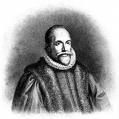
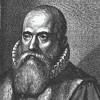




1608 In winter 1607/8 after the English High Court of Ecclesiastical Commission clamps down on religious dissenters, the Scrooby congregation meeting in Scrooby Manor, led by Congregational Church co-founder John Robinson (1576-1625), and the Gainsborough congregation in Lincolnshire meeting in Old Hall, incl. Baptist co-founders Thomas Helwys (1575-1616) and John Smyth (1570-1612) flee to Amsterdam to avoid being burned at the stake for heresy. In Jan. Capt. Christopher Newport returns to the Va. Colony with 100 new settlers (incl. 30 gentlemen), finding only a third of the original settlers still alive (38 of 108); Gov. Wingfield is removed on charges of plotting with the Spanish, and Capt. John Smith again faces hanging (2nd time of two) in hours after his enemies get him charged with negligence for getting two of his men killed by Indians, and saves himself for the 2nd time; after he is spared, Smith has to stop some gentlemen eager to return to England from commandeering a ship by opening up with cannon and musket fire; too bad, after being unloaded from Newport's ship a fire destroys most of the supplies, causing the Jamestown colonists to become totally dependent on the unfriendly Indians, and putting John Smith, who has established relations with them and has his own red babe to be elected pres. of the Jamestown colony council on Sept. 10 (until 1609); being fresh from wars against the Turks in Hungary and Turkey and knowing it all, he becomes a taskmasker, telling them "The greater part must be more industrious or starve", then quotes Apostle Paul, "He that will not work shall not eat", and writes his new Va. Co. bosses in England that there is no way the colony can pay for itself, there is no shortcut to China here, and the odds of survival are about 1 in 4; Pocahontas comes through for Smith by bringing bear meat, venison, and other delicacies; the fort is expanded, and the interior wall is later removed, while Smith explores Chesapeake Bay. In the spring 150 English Puritan Separatists from Scrooby, led by minister John Robinson make a second attempt to depart England for the wonderful land of Virginia, er, the Netherlands, having to leave the women and children quick after the local militia arrive to stop them, and make it to Amsterdam, where the rest catch up to them several mo. later; after encountering other Separatist groups with divergent opinions, causing them to choose to travel to the red-bricked head-with-crown-shaped univ. town of Leiden, where the Dutch tolerance of loose morals and religious diversity makes them welcome as long as they do menial labor from dawn to dusk six days a week in the cloth industry; Robinson buys a house near the Pieterskerk, then sets up De Groene Poort (the green lane) in his garden, a cozy village of a dozen houses; too bad, their "chosen" English children begin turning Dutch, pissing them off, even though they triple their numbers by 1620. On May 14 after getting pissed-off at the occupation and reestablishment of Roman Catholicism in Donauworth, the Protestant States of the Rhineland, incl. Anhalt, Ansbach, Baden, Bayreuth, Brandenburg, Hesse-Cassel, Neuberg, Nurnberg, Palatinate, Strasbourg, Ulm, and Wurttemberg form the Protestant (Evangelical) Union (League) of Anhausen) under Christian of Anhalt and Frederick IV of the Palatinate after deciding that before renewing the 1555 Peace of Augsburg all church lands appropriated since 1552 should be restored; too bad, Calvinist-friendly Christian II of Saxony refuses to join, and the Lutheran and Calvinist members don't get along too well, weakening it, later causing it to stab Frederick IV's son Frederick V in the back in 1620. On May 25 Pope Paul V approves Duke Vincenzo I Gonzaga of Mantua's Military Order of Our Redeemer and the Most Precious Blood of Jesus Christ (AKA Blood of Our Savior) of 20 knights on the occasion of the marriage of his son to a daughter of the duke of Savoy; allegedly some drops of Christ's blood are preserved in St. Andrew's Church in Mantua - it runs in gaggles? On July 3 Samuel de Champlain founds the French village of Quebec on the site of the abandoned village of Stadacona on the St. Lawrence and St. Charles Rivers, establishing the first permanent French settlement in North Am.; nearby 272-ft. Montmorency Falls is taller than Niagara falls. On Aug. 5 a UFO is sighted on the Bay of Angels in Nice, France. In Aug. the King's Men take over the roofed-in Blackfriars Theatre, which is smaller than the Globe but can stage performances at night and in winter and charge more; it is demolished on Aug. 6, 1655; in Sept. (momma's boy?) William Shakespeare's mother Mary dies, and he enters his Fancy Free Age (1608-13). In Oct. the first women arrive in Jamestown, Mistress Forrest and her maid Anne Burras; Forrest dies within the year - dark forrest and burrass jokes here? The Second False Dmitri battles Tsar Vasily IV, defeats him, and advances toward Moscow. HRE Rudolf II cedes Austria, Hungary and Moravia to his brother Matthias. Muslim Druze emir Fakhr al-Din II (1572-1635) of Mt. Lebanon signs a commercial treaty with the grand duchy of Tuscany, which incl. a secret military treaty, all of which causes the Ottomans to want to squash him, which they finally do on Apr. 13, 1635. The English burn rebel town Londonderry in NW Ireland. Henry Hudson makes his Second Voyage, looking for a Northeast Passage through 5.4M sq. mi. of ice - good luck, sucker? Jelali rebel leader Kalenderoglu Mehmed is killed by the Otomans, and the rest of the rebels are mopped up, ending the 1596 Jelali Revolt. Sonjo dies, and Kwanghaegun (Kwan Haegun) (1571-1641) becomes Yi king of Korea (until 1623), restoring peace to the peninsula. The city of Dacca (Dhaka) ("watchtower"?) on the E bank of the Buriganga River in the Bengal Delta in SE India (modern-day pop. 14.4M/18.8M) is founded by the Mughal Empire as the capital of its Bengal Province (until 1639, then 1660-1704), going under the name Jahangir Nagar in the 17th cent., going on to develop a Muslim-majority pop. that wars with the Hindu-majority pop. of Calcutta, becoming known as the City of Mosques, and Venice of the East; in 1947 it is granted city status; in 1947 it becomes the admin. capital of East Pakistan, followed by the legislative capital of Pakistan in 1962, and capital of Bangladesh in 1971; in 1983 the spelling is changed to Dhaka. Dutch anti-predestinarian free-will theologian Jacobus Arminius (Jakob Hermanszoon) (1560-1609) of the U. of Leiden debates with his colleague, Dutch Calvinist theologian Franciscus Gomarus (1563-1641) before the assembly of the estates of Holland, holding that grace is universal and not confined to the elect, and that election is conditioned upon faith and good works, and that therefore Calvin's doctrines of particular election and limited atonement suck; after stirring up a hornet's nest, he dies before he can be put on trial before the Synod of Dort, which goes on to expel the Arminians (they refuse to be called that, calling themselves the Reformed Church) from the Dutch Calvinist Church; his pupil Simon Episcopius (Bisschop) (1583-1643) goes on to win complete religious toleration, and by the the end of the cent. their views are assimilated by the other Protestant churches, incl. the Anglicans and Methodists, and their members get assimilated except for a few holdouts in Amsterdam and Rotterdam - who had the greater will, er, was predestined to win? Santa Fe, N.M. (Sp. "holy faith") (La Villa Real de la Santa Fe de San Francisco de Asissi) at the foot of the Sangre de Cristo Mts. is founded by Juan de Onate, who makes it the capital of the province of New Spain in 1610, becoming the oldest capital city in the modern-day U.S. Cowbridge Grammar School in Wales is founded by Sir John Stradling, 1st Baronet (1563-1637; closed in 1974. The Spiritual Exercises of Ignatius Loyola must now be revisited once a year by every Jesuit. Girolamo Frescobaldi (1583-1643) is appointed organist at St. Peter's in Rome. The first "cash letters" (checks) are used in the Netherlands. English traveler Thomas Coryat (1576-1617), who just returned from a 5-mo. tour of Europe (half of which he walked) brings the custom of eating with a dinner fork ("furcifer") back to England from Italy, causing outrage at first as an insult to human dignity; even the rich eat with their hands until late in this cent., at which time the idea of privacy is invented?; he also describes the principle of the umbrella - get the lingo and watch the possiblities unfold? The first glass manufacturing plant in America is built. Bushmills Distillery in Bushmills, County Antrim, Northern Ireland is licensed by a landowner, after which a co. builds a commercial distillery in 1784, becoming the world's oldest licensed whiskey distillery. Sports: Royal Blackheath Golf Club is founded in London, England. Architecture: Sir Walter Cope begins building the stately Jacobean-style Holland House in Kensington, London (finished 1610). Badminton House in Gloucestershire, England 100 mi. W of London is acquired from Nicolas Boteler by Thomas, Viscount Somerset (d. 1650), whose daughter Elizbeth gives it to Henry Somerset, 3rd Marquess of Worcester and 1st Duke of Beaufort (1629-99), who builds a new mansion in 1682, which later hosts the first Badminton game in 1873. Inventions: Dutch eyeglass maker Hans (Johann) Lippershey (1570-1619) applies for a patent for the telescope (Gr. "far-seeing"), which is first used to look at the sky by Galileo, who constructs his own next July 1 mo. after hearing about it. Nonfiction: Thomas Coryat (1576-1617), Coryat's Crudities Hastily Gobbled up in Five Months Travels in France, Italy, &c. John Donne (1572-1631), Biathanatos; not pub. until 1644; defends suicide (self-homicide), "the scandalous disease of headling dying" by citing Jesus, Samson, Saul, and Judas, admitting that he himself had "often such a sickly inclination." Edward Grimestone, A General History of the Netherlands. William Perkins, A Discourse of the Damned Art of Witchecraft (posth.). St. Francis de Sales (1567-1622), Introduction a la Vie Devote (Introduced to the Devoted Life). Capt. John Smith (1580-1631), A True Relation of Virginia Since the First Planting of that Colony. Art: Domenichino (1581-1641), The Scourging of St. Andrew (San Gregorio Magno, Bologna); goes into a mean funk while painting, causing Annibale Carracci to utter the soundbyte "Today, my dear Domenichino, you are teaching me". El Greco (1541-1614), Golgotha; Cardinal Taverna; Baptism of Christ (1608-14). Music: Marco da Gagliano (1582-1643), Dafne (opera); libretto by Rinuccini. Claudio Monteverdi (1567-1643), L'Arianna (opera) (Mantua); about Ariadne and Thesus; another hit; only the aria Lamento di Arianna survives. Plays: George Chapman (1559-1634), The Conspiracy and Tragedy of Charles, Duke of Byron, Marshal of France. Joseph Hall (1574-1656), Characters of Virtues and Vices. Ben Jonson (1572-1637), The Masque of Beauty (Whitehall Palace, London) (Jan. 10); sequel to "The Masque of Blackness" (1605); the "daughters of Niger" are finally cleansed of the black pigment to be white and right. Thomas Middleton (1580-1627), A Mad World, My Masters (satirical comedy). William Shakespeare (1564-1616), The Pied Bull (First) Quarto. Poetry: Richard West, A Century of Epigrams; that's 100 of them. Novels: George Wilkins (1576-1618), The Painful Adventures of Pericles, Prince of Tyre; "The true history of Pericles as it was lately presented by... John Gower." Births: Italian physiologist-physicist ("Father of Modern Biomechanics") Giovanni Alfonso Borelli (d. 1679) on Jan. 28 in Castel Nuovo (near Naples); enjoys the protection against the Inquisition of Queen Christina of Sweden, saving him from Galileo's fate. German Jesuit scientist Gaspar Schott (d. 1666) on Feb. 5 in Konigshofen; educated at the U. of Wurzburg, and U. of Palermo; first to describe a universal joint and classify gear teeth. Brazilian Jesuit scholar-writer FatherAntonio Vieira (d. 1697) on Feb. 6 in Lisbon. French duke (1626-60) Jean Baptiste Gaston, Duke of Orleans (d. 1660) on Apr. 25 in Fontainbleau; 3rd son of Henri IV and Marie de' Medici; brother of Louis XIII. Dutch Golden Age architect-painter-printmaker Pieter Jansz Post (d. 1669) on May 1 in Haarlem; brother of Frans Post (1612-80); father of Maurits Post (1645-77), Johan Post, and Maria Post, wife of Frederik Ruysch (1638-1731) and mother of Rachel Ruysch (1664-1750); collaborator of Jacob van Campen (1596-1657); creator of the Dutch Baroque style of architecture. German HRE (1636-57), Hungarian king (1625-57), and Bohemian king (1627-57) Ferdinand III (d. 1657) on July 13 at Graz, Austria. English botanist-gardener John Tradescant the Younger (d. 1662) on Aug. 4 in Meopham, Kent; son of John Tradescant the Elder; educated at King's School, Canterbury. Italian physicist-mathematician (pupil of Galileo) (inventor of the barometer) Evangelista Torricelli (d. 1647) on Oct. 15 in Rome. English soldier-politician capt.-gen. George Monck (Monk), 1st Duke of Albemarle (d. 1670) on Dec. 6 in Merton, Devonshire; 2nd son of Sir Thomas Monck; father of Christopher Monck, 2nd duke of Albemarle (1653-88); becomes a soldier after assaulting the undersheriff for wronging his daddy and fleeing abroad. English "Paradise Lost" #1 poet ("the Blind Poet") John Milton (d. 1674) on Dec. 9 in Cheapside, London; educated at St. Paul's School, and Cambridge U.; ditches his plans to become an Anglican clergyman after rejecting William Laud's absolutist principles. English merchant and mercantilist economist Edward Misselden (d. 1654). English "The Worthies of England" churchman-historian Thomas Fuller (d. 1661) in Aldwincle St. Peter's, Northamptomshire; educated at Queen's College, Cambridge U. Deaths: French sculptor Giovanni da Bologna (b. 1524). Flemish sculptor Giambologna (b. 1529) on Aug. 13 in Florence, Italy; leaves the sculpture he leaves Architettura, a nude woman holding a compass and a square ruler. Italian sculptor Pompeo Leoni (b. 1531). Italian mathematician Fabrizio Mordente (b. 1532). French judge-poet Nicolas Rapin (b. 1535) on Feb. 16 in Poitiers; dies en route to Paris to visit friends. English statesman-poet Thomas Sackville, 1st earl of Dorset (b. 1536) on Apr. 19 in Westminster. Scottish poet-jurist Sir Thomas Craig (b. 1538) on Feb. 26. English secy. of state William Davison (b. 1541) on Dec. 21. French historian Lancelot Voisin de La Popeliniere (b. 1541). Italian jurist-philosopher Alberico Gentili (b. 1552) on June 19 in London. English celeb William Shakespeare's mother Mary (b. ?) in Sept.









1609 On Feb. 17 Ferdinando I de' Medici (b. 1549) dies, and his eldest son Cosimo II de' Medici (1590-1621) becomes grand duke of Tuscany (until Feb. 28, 1621). On Mar. 19 the Dutch ship Mauritius sinks off Gabon. In Mar. James I makes speeches to Parliament promoting the divine right of kings theory - a wee bit self-serving? On Apr. 9 Spain signs the Twelve Years' Truce (ends 1620) with the Protestant United Provinces of the Netherlands in Amsterdam, which have been fighting to throw off their Roman Catholic yoke), and Philip III grudgingly acknowledges their independence, allowing him and his minister the duke of Lerma to concentrate on internal problems, while Hapsburg archdukes Albert and Isabella use the truce to consolidate their rule and push the Counter-Reformation - want some loose Jews? On Apr. 9 having to save face over the pesky Protestants, Spanish king (1598-1621) Philip III (1578-1621) takes care of some unfinished business and orders the expulsion of the Moriscos (Jews and Muslims of Moorish ancestry who faked Christian conversion since the days of Cardinal Francisco Jimenez in 1492-1501); by 1614 over 275K are expelled; the Roman Catholic Spanish go on to erase all traces of Muslim occupation of Spain, and burn 1M Arabic books - what was that ruckus in 711? On Apr. 15 Veera Kerala Varma of Cochin dies, and Ravi Varma I (d. 1624) becomes ruler of Cochin in India (until 1624). The original Bermuda syndrome? On May 23 James I grants a 2nd charter to Virginia, replacing the ineffective council with royal gov. Lord Delaware and an advisory council; they finally dig a well in Jamestown early in the year; in May Lord Delaware sends Sir Thomas Gates as interim gov., with nine ships and 500 passengers (promised free land after seven years of indentured servitude) and crew to reinvigorate and resupply Jamestown; the fleet is led by Capt. Sir George Somers (1554-1610) of the Sea Venture; Gates and Somers are shipwrecked on coral-ringed Bermuda (on the same lat. as Cape Hatteras), where they spend the winter enjoying the local fish, fowl and wild pigs, and build ships and reach Va. next May, leaving some English behind to settle Bermuda (Somers Isles) and build forts; meanwhile the rest of the fleet reaches Jamestown with 400 settlers, most of them "unruly gallants packed hether by their friends to escape il destinies", and they overwhelm the fragile balance of the 80 colonists they find there, just in time for the Starving Time; next year Somers returns to Bermuda and dies "of a surfeit in eating pig", which is later immortalized by Shakespeare in The Tempest. In the summer English explorer Henry Hudson (1566-1611) begins his Third Voyage to search for a Northwest Passage in the Dutch ship Half Moon (Halve Mein); on Aug. 28 after a budding mutiny of his crew causes him to reverse course and head toward the New World, he discovers Delaware Bay and the Delaware River; on Sept. 11 he discovers New York Bay, sailing into the Hudson River on Sept. 12 and founding New Amsterdam (renamed New York in 1664) on the Hudson River, while setting eyes upon the wooded island of Manhattan, from the Lenape word Mannahatta, meaning island of many hills; on Sept. 14 he enters the Tappan Zee (Sea) 10 mi. N of Manhattan, thinking that the widening of the Hudson River indicates a Northwest Passage, then giving up after reaching modern-day Troy; meanwhile he makes the first Euro encounter with the Mohicans (Mahicans); upon returning to Europe he is arrested for sailing under another nation's flag - does that make him an illegal alien? On July 10 the German Catholic League, modeled on the 1576 French Catholic League is founded in Munich by Maximilian I of Bavaria "for the defense of the Catholic religion and peace within the Empire", i.e., to oppose the new German Protestant Union; members incl. Augsburg, Constance, Passau, Ratisbon, and Wurzburg; Salzburg and Ecichstadt pass; on Aug. 30 Mainz, Cologne, and Trier join, providing that the elector of Mainz becomes co-pres. On Aug. 19 seven Franciscan missionaries led by Fray Blas Palomino found the settlement of Baler (modern-day pop. 40K) on the S end of Baler Bay on the W shore of the Philippine Sea in modern-day Aurora 144 mi. NE of Manila; in 1658 the Augustinians Recollects turn it into a town; in 1703 the Franciscans take over the admin.; on Dec. 27, 1735 a tsunami destroys the town, which is rebuilt on Ermita Hill; in modern town it becomes a top vacation spot, known for the best surfing in Southeast Asia. On Sept. 6 John Colman, a sailor in Henry Hudson's mostly-Dutch Half Moon crew of 16 becomes the first recorded murder in future New York City while anchored between Coney Island and Sandy Hook after their 16-ft. shallop containing him and four others is ambushed by two dugouts containing a total of 30 Indians; it is unsolved until ?. In Oct. an accident causes Capt. John Smith to receive a bad gunpowder burn, and and returns to England for treatment, just in time to avoid the Starving Time (his departure making it more certain?), and never sees Virginia again; Pocahontas is told he is dead, causing her to go nonlinear and avoid Jamestown for the next four years; just before leaving Smith pisses-off Powhatan chief Wahunsonacock for sacking a village and stealing half of its provisions on the eve of a harsh winter, and after he summons him to his lodge and offers to trade in peace, Smith tells him off, saying, "For your riches we have no use", and that "In... wars consist our chiefest pleasure" - I am proud to be part of the wolf nation? In the winter Powhatan chief Wahunsonacock, fed up with the English (Smith) taking their food by force and subjecting them to famine, and knowing that Smith has taken a hike, cuts off trade with Jamestown then sieges their fort, trapping 500 inside over the winter, causing the Starving Time, where the pop. is reduced to 60 after all the livestock and horses (incl. dogs, cats, vermin) are eaten, and one man dines on (don't say eats?) his wife; forensic proof of cannibalism is not obtained until 2013; eight German and Polish craftsmen sent to manufacture glass turn wild and run off with the Indians? Julich-Cleves-Berge dies without heir, launching the War of the Julich Succession (ends 1614). Francis Beaumont and John Fletcher replace William Shakespeare as chief dramatists of the King's Men. Egyptian soldiers revolt against the Ottomans again, and are crushed. Catholic missionary Nicolas Trigault (1577-1628) comes to China. Tea from China is shipped for the first time to Europe by the Dutch East India Co. - time for a spot of tea? A regular supply caravan is organized on El Camino Real in New Mexico, consisting of 32 wagons and a dozen soldiers, who take 18 mo. for a round trip. A congregation of female Jesuits is founded, but is later dissolved by Pope Urban VIII. HRE Rudolf II permits freedom of religion in Bohemia. Bawdy satirist John Marston becomes an Anglican clergyman, and is later appointed rector of Christchurch from 1616-31 - what good's life if you aren't having any fun? Peter Paul Rubens (1577-1640), who returned to Antwerp last Oct. is appointed court painter to Archduke Albert and his wife Isabella. Tin-enameled ware begins to be made in Delft. After the siege of Antwerp causes trade to move to Amsterdam, the Amsterdam Exchange Bank (Amsterdamsche Wisselbank) is founded by the Rothschild family and the Dutch House of Orange, becoming the first private central bank, causing Amsterdam to become the financial center of the Western world until the Industrial Rev. The Charterhouse public school in England is founded. Avisa Relation oder Zeitung begins pub. in Wolfenbuttel, Germany. Architecture: The 38-mi. New River Canal, to bring fresh water from Hertfordshire to London, by Welsh engineer Hugh Myddleton (1560-1631) is begun (finished 1613), losing him a lot of money but eventually getting him a baronetcy, a first for an engineer (next John Rennie the Younger in 1831). The Blue Mosque of Ahmed I in Constantinople is begun (finished 1616). Science: Two ways to shoot the Moon? The salary of Pisa-born Italian scientist Galileo Galilei (1564-1642) is doubled by the senate of Venice for his invention of the Astronomical Telescope after he views the Moon at 6X magnification in Aug. (later increased to 20X), noting that it has mountains, and discovers Jupiter's moons (not all 63 of them); a believer in astrology, he prepares the horoscope of the Grand Duke of Tuscany and predicts that he will have a long life, only to see him die a few weeks later - a little bit of bacon, a little bit of beans? The first Rinderpest Panzootic (cattle plague) begins (ends 1713), causing a simultaneous anthrax pandemic that kills 60K in S Europe by 1713; others follow in the 1740s and 1770s, killing 200M cattle by 1769, 20% of the total pop.; meanwhile Venetian physician Bernardino Ramazzini (1633-1714) begins scientific study of the causes of rinderpest, causing him to suggest immunization. Nonfiction: Sir Francis Bacon (1561-1626), De Sapienta Veterum. Charles Butler, De Feminine Monarchie, or a Treatise Concerning Bees; the hive is an "Amazonian or feminine kingdom", with sex only if really necessary? English College of Reims (Rheims) (Rhemes), The Douay Old Testament (1609-10); with the Douay New Testament (1582) it becomes the std. for English-speaking Roman Catholics; English Protestants criticize it then turn around and use it when preparing their King James vers.? Hugo Grotius (1583-1645), Mare Librum (The Free Sea); formulates the principle of freedom of the seas, giving the Dutch the rationale for breaking up trade monopolies through its sea power in order to establish its own, pissing of the British, who claim dominion of the "British Sea", which is settled in 1702 by Cornelius van Bynkershoek, who sets a 3-mi. territorial limit based on the range of cannon fire. Johannes Kepler (1571-1630), New Astronomy; the first book on modern astronomy, containing first two Kepler's Laws of Planetary Motion (3rd law pub. in 1619) (1: every planet follows an elliptical orbit around the Sun, which is one focus of the ellipse; 2: a radius from the Sun to the planet sweeps out equal areas in equal times); De Motibus Stellae Martis; to prepare it he performed 7.2K complex complications on the observation tables of Mars. B. Langenes, Map of the Amazon. Thomas Robinson, New Citharen (Cittern) Lessons. Garcilaso de la Vega, Comentarios Reales Que Tratan del Origen de los Incas (History of the Conquest of Peru) (1609-17). Lope de Vega (1562-1635), The New Art of Writing Plays. Music: Orlando Gibbons (1583-1625), Fantasies of Three Parts (3 vols.); first example of engraved music in England. Thomas Ravenscroft (1582-1635), Pammelia: Musicks Miscellanie (rounds and catches); Deuteromelia; or The Second Part of Musicks Melodie; contains Three Blind Mice. Johann Hermann Schein (1586-1630), Venus Krantzlein. Art: El Greco (1541-1614), Brother Paravicino. Peter Paul Rubens (1577-1640), Self-Portrait with Wife Isabella Brant in the Honeysuckle Bower; Helene Fourment. Plays: Francis Beaumont (1584-1616) and John Fletcher (1579-1625), Philaster; The Knight of the Burning Pestle - didn't I see that Danny Kaye movie? Ben Jonson (1572-1637), Masque of Queens; Epicoene, or The Silent Woman (comedy). Thomas Middleton (1580-1627), A Game at Chess (comedy). William Shakespeare (1564-1616), The Winter's Tale (1609-10) (comedy) (Leontes has 648 lines, 17th most); King Leontes of Sicilia and his wife Queen Hermione and son Prince Mamillius and daughter Perdita ("marooned"), who is marooned on "the sea-coast of Bohemia"; King Polixenes of Bohemia and his son Prince Florizel; thief Autolycus, Sicilian lord Antigonus and his wife Paulina; Leontes' advisor Camillo, who refuses to poison Polixenes and helps him escape after Leontes gets jealous of Polixenes, thinking he's hooking up with his wife Hermione, with Leontes uttering the soundbyte: "And many a man there is, even at this present,/ Now while I speak this, holds his wife by th'arm,/ That little thinks she has been sluiced in's absence/ And his pond fished by his next neighbor, by/ Sir Smile, his neigbor" (1.2.192-6); after Polixenes escapes, Leontes imprisons Hermione and has her newborn child Perdita abandoned, after which Mamillius dies pining for his mother Hermione, who dies of a broken heart, after which Leontes wakes up, and tries to find Perdita in vain, after which she grows up and hooks up 16 years later with Florizel, is revealed as Leontes' daughter, and Perdita is found to be playing a statue to keep away from him, but now hooks back up with him, for a happy ending, except for Mammilius; "You pay a great deal too dear for what's given freely" (1.1); We were, fair queen,/ Two lads that thought there was no more behind/ But such a day to-morrow as to-day,/ And to be boy eternal/... We were as twinned lambs that did frisk i' the sun,/ And bleat the one at the other: what we changed/ Was innocence for innocence; we knew not/ The doctrine of ill-doing, nor dream/d/ That any did/... 1.2.78-87) (Polixenes to Hermione about him and Leontes in their youth); "But to be paddling palms and pinching fingers,/ As now they are, and making practised smiles,/ As in a looking-glass" (Leontes) (1.2.115-7); "How like, methought, I then was to this kernel, This squash, this Gentleman" (1.2); "A sad tale's best for winter: I have one/ Of sprites and goblins" (Mamilius) (2.1.25-26); "It is a heretic that makes the fire,/ Not she who burns in 't" (2.3); "I am a feather for each wind that blows" (2.3); "What's gone and what's past help/ Should be past grief" (3.2.223-4) (Paulina to Hermione); "Exit, pursued by a bear" (meaning Antigonus) (3.3.58); "For the red blood reigns in the winter's pale" (Autolycus) (4.3.4); "A snapper-up of unconsidered trifles" (Autolycus) (4.3.1); "Though I am not naturally honest, I am so sometimes by chance" (Autolycus) (4.4.712-3); "I love a ballad in print o'life, for then we are sure they are true" (4.4); "To unpathed waters, undreamed shores" (4.4); "'Tis time; descend; be stone no more; approach" (Paulina to the statue of Hermione) (5.3.99); the quarto ed. of William Shakespeare's Sonnets is pub.; ""When forty winters shall seige thy brow,/ And dig deep trenches in thy beauty's field" (Sonnet 2, line 1); "Everything that grows/ Holds in perfection but a little moment" (Sonnet 15, line 1); "Shall I compare thee to a summer's day?/ Thou art more lovely and more temperate./ Rough winds do shake the darling buds of May,/ And summer's lease hath all too short a date." (Sonnet 18, lines 1-4); "Clean starved for a look" (Sonnet 75, line 10); "Lillies that fester smell far worse than weeds" (Sonnet 94, line 14); "To me, fair friend, you never can be old,/ For as you were when first your eye I ey'd,/ Such seems your beauty still" (Sonnet 104, line 1); "For I have sworn thee fair, and thought thee bright,/ Who art as black as hell, as dark as night" (Sonnet 147, line 13). Poetry: Sir Fulke Greville (1554-1628), The Tragedie of Mustapha. Cyril Tourneur (1575-1626), A Funeral Poem Upon the Death of the Most Worthie and True Soldier, Sir Francis Vere, Knight. Novels: Thomas Dekker (1572-1632), The Gull's Hornbooke; satire of London life. Births: English "Ballad Upon a Wedding" Cavalier poet-soldier-gallant-parliamentarian Sir John Suckling (d. 1642) on Feb. 10; inventor of Cribbage - if you have baggage, I want to know about it, have you met me? English statesman-historian (member of the Great Tew Circle) Edward Hyde, 1st Earl of Clarendon (1609-74) on Feb. 18; 3rd son of Henry Hyde (-1634) and Mary Langford; educated at Magdalen Hall (Hertford College), Oxford U.; father of Anne Hyde (1637-71); maternal grandfather of Queen Mary II and Queen Anne; educated at Magdalen Hall (Hertford College), Oxford U.; father of Henry Hyde, 2nd earl of Clarendon (1638-1707) and Laurence Hyde, earl of Rochester (1641-1711). Italian Austrian field marshal Raimondo, Count of Montecucculi (Montecuccoli) (d. 1680) on Feb. 21 in Modena; Neapolitan duke of Melfi; of Burgundian descent. Danish-Norwegian king (1648-70) Frederick III (d. 1670) on Mar. 18 in Haderslev, Slesvig; son of Christian IV and Anne Catherine of Brandenburg. Polish-Lithuanian king (1648-68) (Jesuit) Jan (John) II Casimir (d. 1672) on Mar. 22 in Cracow; son of Sigismund III Vasa (1566-1632) and Constance of Austria (Hapsburg) (1588-1631); half-brother of Wladyslaw IV Vasa. French Canal du Midi engineer Pierre Paul Riquet (d. 1680) on June 29 in Baziers, Herault. German poet-physician Paul Fleming (d. 1640) on Oct. 5 in Hartenstein, Vogtland, Saxony; educated at the U. of Leipzig. Danish marshal (of France) Josias Rantzau (d. 1650) on Oct. 18 near Kiel; great-grandson of Johann Rantzau (1492-1565). English/Scottish queen consort (1625-49) Henrietta Maria (d. 1669) on Nov. 25 in Palais du Lovre, Paris, France; youngest daughter of Henri IV (1553-1610) and Marie de' Medici (1575-1642); sister of Louis XIII (1601-43); wife of Charles I of England/Scotland (1600-49); mother of Charles II (1630-85) and James II (1633-1701). English academic-clergyman Gerard Langbaine the Elder (d. 1658) in Barton, Westmoreland; educated at Queen's College, Oxford U. Dutch seascape painter Joachum Aelbrechtsz de Vries (d. 1670). English miniature painter Samuel Cooper (d. 1672). English jurist-statesman (lord chief justice) Sir Matthew Hale (d. 1676) on Nov. 1 in Alderney, Gloucestershire; knighted in 1660. English anarchist-communist Diggers founder Gerrard Winstanley (d. 1676) in Wigan, Lancashire. Engish Puritan divine Benjamin Whichcote (d. 1683) in Stoke upon Tern, Shropshire; educated at Emmanuel College, Cambridge U. Deaths: Flemish #1 horticulturist Charles de l'Ecluse (b. 1526) on Apr. 4 in Leiden. English alchemist-astrologer John Dee (b. 1527) in Mar. in Mortlake, Surrey; leaves his theory of Enochian Angels, who dictate books to him in their special angelic Enochian language after attempting to contact spirits through scryers or crystal-gazers and numerological Qabalistic angel magic. Scottish soldier James Hamilton, 3rd earl of Arran (b. 1532) in Mar. in Craignethan Castle; insane since 1562. Spanish composer Fernando Las Infantas (b. 1534). French "Julian Day" scholar Joseph Scaliger (b. 1540) on Jan. 21 in Leiden. Italian painter Federico Zuccari (b. 1542) on July 20 in Ancona. Italian grand duke of Tuscany (1587-1609) Ferdinando I de' Medici (b. 1549) on Feb. 17. Dutch anti-predestination theologian Jacobus Arminius (b. 1560) on Oct. 19 in Leiden. Italian painter Annibale Carracci (b. 1560) on July 15.